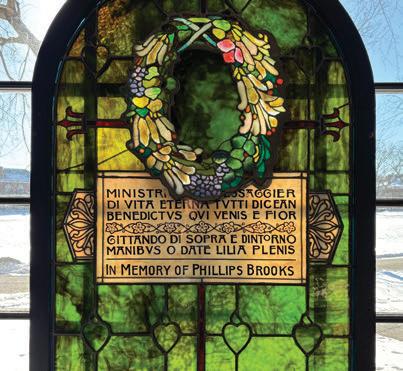
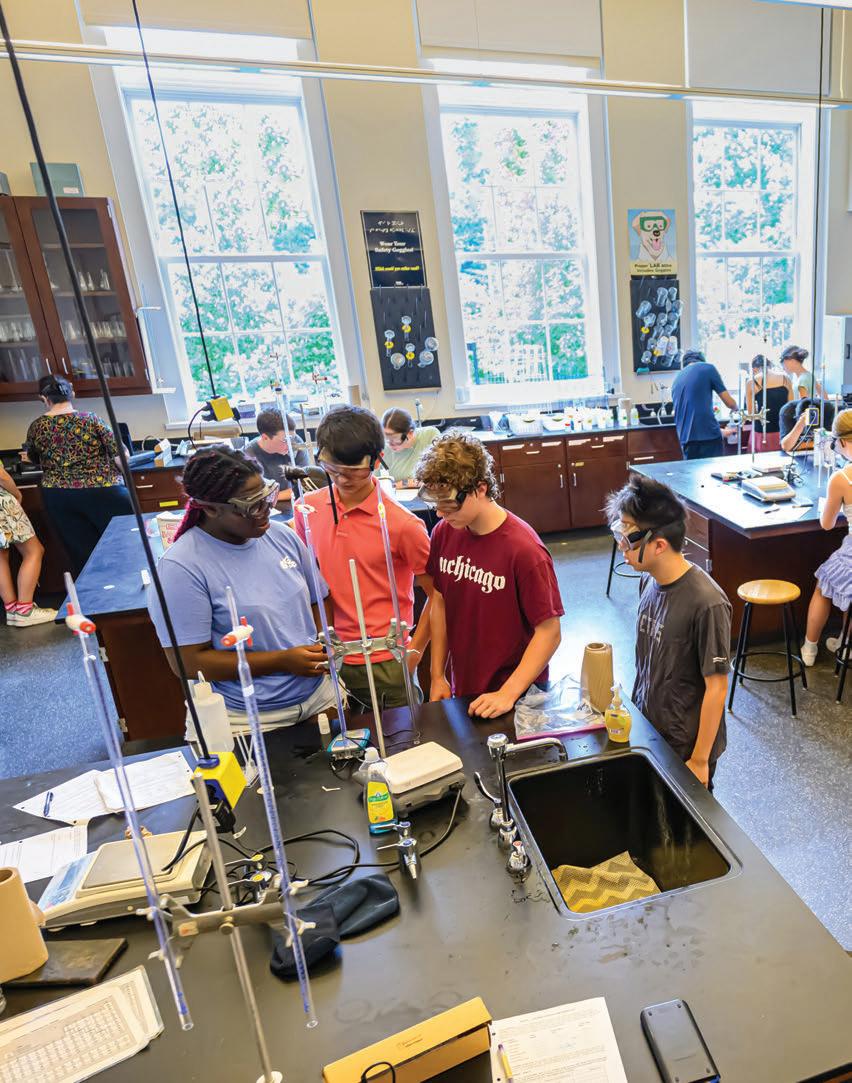
Celebrating ten years of summer enrichment on the Circle
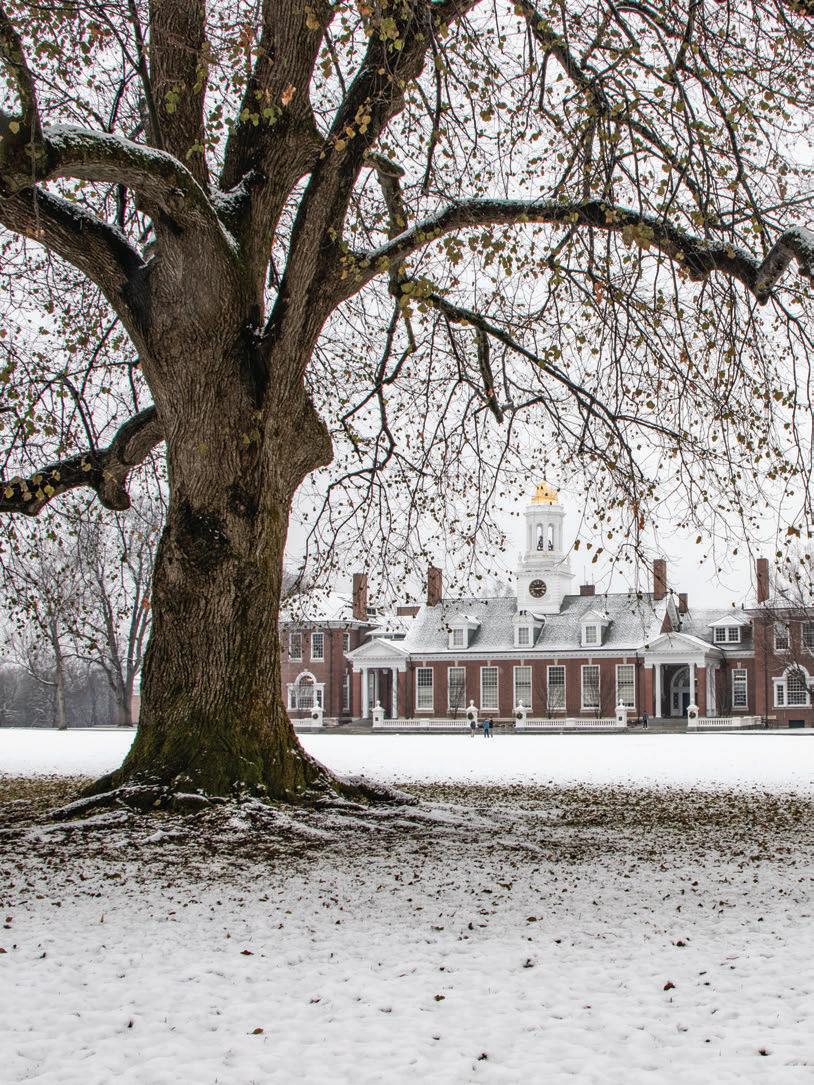
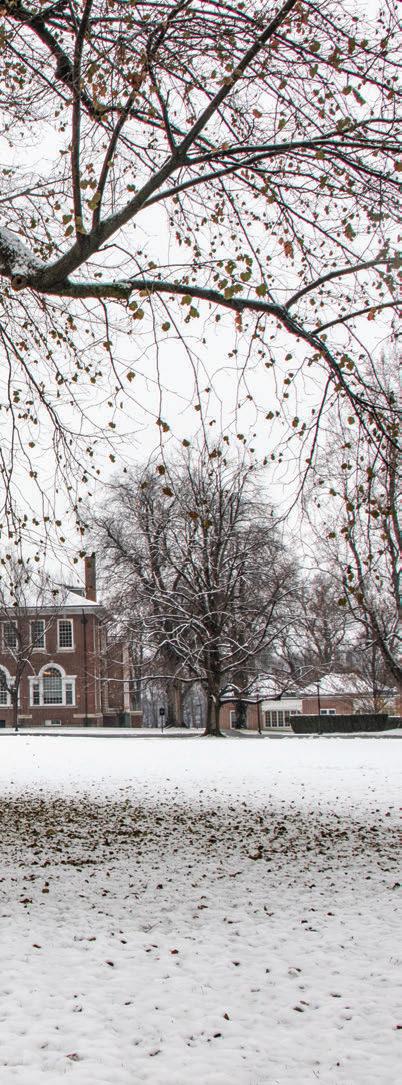



Celebrating ten years of summer enrichment on the Circle


The Quarterly • Winter/Spring 2025
Volume LXXXVI, No. 1
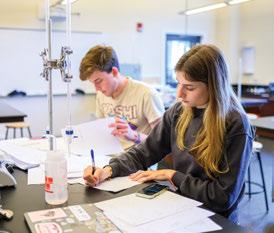
As the GRoton Accelerate Challenge Enrich program better known as GRACE c elebrates its tenth anniversary, we take a closer look at how this new summer tradition works to ensure the success of an increasingly diverse student body once it arrives on the Circle. page 12
departments
2 Message from the Headmaster
3 Circiter / Around the Circle
22 Personae / Profiles
26 Voces / Chapel Talks
35 De Libris / N ew Releases
36 Grotoniana / Athletics
46 Grotoniana / Arts
50 In M emoriam
53 Form Notes
this summer marks the tenth iteration of our GRoton Accelerate Challenge Enrich summer program, better known as GRACE. When we launched GRACE in 2016, we were hopeful that it would, in turn, help our students. I’m happy to report that, ten years in, GRACE has exceeded that expectation.
From its start, GRACE recognized the exceptional talent of Groton students, as well as the varying preparation gaps they bring to the Circle. GRACE came out of the realization that, in many well-meaning, successful schools, the focus tends to be on access, which is fantastic when schools bring students in from across the spectrum. But when they come to schools like Groton, they may have uneven preparation, not through their own fault but because they come from a variety of educational experiences. This I view as a preparation gap rather than one mistakenly viewed as an achievement gap.
GRACE began as a modest attempt to address the aforementioned preparation gaps as well as provide Third Formers who would like to accelerate in an academic area the opportunity to do so before they go to the Upper School. GRACE is really in the GRAIN (GRoton Affordability INclusion) mindset. Where GRAIN is about access, GRACE is about striving for success. The emphasis is on taking students “beyond”: beyond access to success.
There was a program similar to GRACE I spearheaded at Andover called ACE and it covered subjects in three departments. When I came to Groton, ACE became GRACE. So I asked Associate Dean of Academics Dave Prockop to go and talk to fellow practitioners who worked at ACE. He did so, thoughtfully adding to the concept to make it tailor-made to Groton. This was achieved through getting buy-in from all departments and informing all rising Fourth Formers. Dave accomplished this admirably and ran the program for the first three years.
We started with twenty-five students that first summer and thought the maximum might end up around thirty. Little did we know how amazing the GRACE appeal would be. Participation grew steadily each year and this past summer we hit another record, with sixty-one students taking part. This year more than seventy have signed up!
Editor Sean Kerrigan
Design
Stoltze Design Group
Senior Editorial Advisors
Kathleen M. Machan
Christopher Temerson
Form
Notes Editor
Jessica M. Hart
Editorial Assistant
Alyssa Mattei
Advisory Committee
Amily E. Dunlap
Kimberly A. Gerighty
Giulia King
Allison S. MacBride

by Mitch Weiss
Faculty participation has grown as well. What started as eight offerings of math, science, classics, and English has now more than doubled to eighteen courses, including art, world languages, history, and humanities. It’s become a mini school in the summer, not by invitation, but voluntary on the part of the students.
In 2019, the program evolved further, when I suggested that we add teaching assistants to help faculty. Typically these were recent Sixth Formers who had taken part in GRACE themselves. That created a level of excitement that I have not seen before. The prefects became teachers.
It was fortuitous that we launched GRACE in 2016 because when COVID hit and students came to us with lockdown-related gaps and learning loss, we had a tested program to address learning loss exacerbated by the pandemic. It was prescient that we already had a program that was as stable and successful as GRACE.
Today, as we approach GRACE’s tenth summer, I am proud of the progress we have made, and the opportunities we’ve provided so many of our students. The month I spend teaching at GRACE is among my favorites of the year. It’s so refreshing to purely be a classroom teacher for a few weeks. Because there are no grades, students and teachers are given T-shirts at the start of the program with “GRACE not GRADES” on the back. The emphasis is on learning without the pressure of grades. It’s learning in its purest form. Some are accelerated, others are challenged, and all are enriched in the process.

Temba Maqubela Headmaster
John D. MacEachern P’10, ’14, ’16
Paul Ryan
Editorial Offices
The Schoolhouse
Groton School
Groton, MA 01450
978 - 4 48 - 7506
quarterly@groton.org
Send feedback, ideas, or letters to the editor to quarterly@groton.org.
Other School Offices
Alumni Office: 978 - 4 48 - 7520
Admission Office: 978 - 4 48 - 7510
Groton School publishes the Groton School Quarterly three times a year, in the fall, winter, and spring/summer, and the Annual Report once a year.

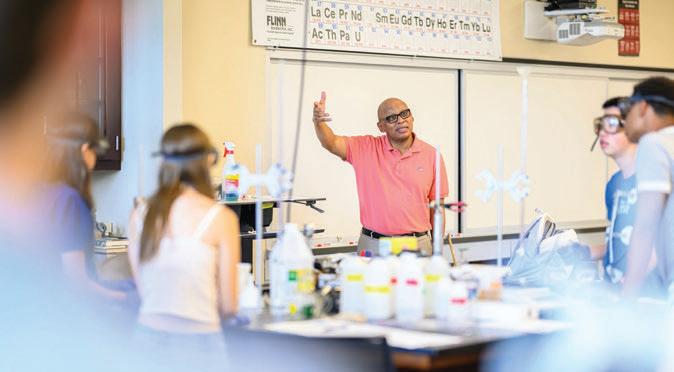
groton school has received a $2 million commitment from John Childs ’59, trustee emeritus, to establish the Temba T. Maqubela Chair in Organic Chemistry, named in honor of Groton’s eighth, and current, headmaster, who also teaches the course.
“For many years, I have been very impressed with the job Temba has done in that most challenging position, headmaster of Groton School, and so I felt his work deserves special recognition,” said Mr. Childs. “Through my business involvement in life sciences, I have come to appreciate the foundational role of organic chemistry in this field that is transforming drug discovery. The resulting impact on life expectancy and quality is vast, so making the course a permanent part of the Groton experience coalesced around Temba’s accomplishments and leadership.”
Teaching chairs serve as an enduring tribute to those for whom they are named as well as an honor for the educator who holds the chair. This newest chair has a special connection to one that was also
fully funded the Paul W. Wright Chair in Mathematics, established by two members of the Form of 1941. Both the Wright Chair and the Maqubela Chair celebrate Groton headmasters who also taught during their tenure as the school’s leader, and both chairs are in STEM disciplines sc ience and mathematics.
“This most generous gift from John Childs recognizes and validates that education begins with teaching,” said Mr. Maqubela. “To be connected with another STEM headmaster ou r fourth headmaster, Paul Wright, who taught math here for forty-six years th rough an endowed chair is a rare and singular honor. I look forward to naming an outstanding member of Groton’s STEM faculty as the first holder of this chair.”
The Maqubela Chair in Organic Chemistry also celebrates the ongoing importance of science in the Groton curriculum and the particular importance of chemistry in the study of the sciences. Through the Groton Accelerate, Challenge,
and Enrich (GRACE) summer program, founded in 2016, Groton students continue to accelerate in chemistry while at Groton. One of the many academic opportunities GRACE provides rising Fourth Formers is the chance to study honors-level chemistry over the four-week summer program. As a result, Groton has a very high percentage of Fourth Formers who take AP Chemistry in one year instead of two, which enables those students to pursue the Organic Chemistry course while on the Circle. The establishment of this chair by Mr. Childs helps to ensure the opportunity for acceleration in organic chemistry continues in perpetuity at Groton.
“The donor’s decision to endow a faculty chair in Temba’s name highlights both the recognition of Temba’s leadership and the alignment of their shared passion for science,” said Director of Development and Alumni Affairs John MacEachern P’10, ’14, ’16. “This gesture not only honors Temba’s contributions but also underscores the importance of fostering academic excellence in a field or ganic chemistry that plays a crucial role in innovation and research.”
if you’ve enjoyed the Quarterly at any point over the past dozen or so years, then you’ve enjoyed the work of our longtime designer, Irene Chu. Irene took over design of the magazine the fall of 2013 and has been in charge of the publication’s visual identity since then.
During that time, Irene has grown to become a trusted member of the Groton School family, working on myriad design projects ranging from our annual report to the Lessons & Carols program. She was a steady presence during the last transition between Quarterly editors, and a crucial member of our team.
Therefore it is with mixed emotions that I share the news of Irene’s retirement. The fall Quarterly was her last. I will miss working with her, but wish her nothing but the best in whatever comes next. She is always welcome on the Circle.
Change isn’t always easy, but it’s always easier when you have a talented friend who’s interested in helping you out. So I am pleased to announce that, beginning with this issue, the Quarterly will be designed by Stoltze Design of Boston. When Irene shared her news, Stoltze was one of the first firms we contacted. They know Groton and all the things that make this place, and this community, so special.
Groton’s relationship with Stoltze Design goes back to 2019, when they began developing a new suite of admissions materials with Dean of Admission and Financial Aid Ian Gracey and former director of communications Gail Friedman. During that project, they refined the approach to typography to reflect Groton’s progressive education model while still honoring our historical legacy. The theme of “Dynamic Equilibrium” inspired us to be more expressive with the layout and photography, allowing us to highlight individual student achievements and voices.
Stoltze was also engaged to update the Groton Zebras athletics branding, including a circular redrawing of the zebra mascot. In addition, they have extensive experience with alumni magazines for both independent schools and higher education, including Milton Magazine, MIT Spectrum , Harvard Dental , and Kellogg Magazine
I’m already excited about the direction in which we’re headed. Stoltze has helped us refresh the look of the Quarterly while keeping in line with the visual identity we’ve developed over the past few years.
“Our approach to updating the Quarterly began with a simpler, bolder cover treatment, featuring ‘Groton’ as the magazine title, set in Berlingske a modern interpretation of a classic calligraphy-built serif font en suring consistency with other Groton materials we’ve designed over the years,” explains Founder and Creative Director Clif Stoltze. “We are also incorporating the fonts Post Grotesk and Miller in various combinations for headlines and text, selected for their legibility and elegance. While the publication’s page size remains the same, we have restructured the underlying grid to accommodate more content and to enhance readability. As always, the design will incorporate a mix of photography from various sources to bring the content to life.”
Please join me in thanking Irene and wishing her all the best in her retirement, and in welcoming the Stoltze Group to the Groton family.
—S ean Kerrigan

Groton students embrace the freedom of improvisation
improvisation has always been an important part of Music Department Head Mary Ann Lanier PhD’s development as a musician. This fall she was happy to share her love for the craft with Groton School students through a workshop and free concert featuring conductor/ violinist David Rudge PhD.
“In my work at Groton, I have incorporated improvisation into my work with students,” said Dr. Lanier, who earned her Doctor of Musical Arts in Music Education degree from Boston University this past March. “I gave a chapel talk in the winter of 2023 that was based on my work and that included several segments of free musical improvisation including with the entire school singing. When I have performed at Groton, I have often included free improvisation pieces and, in January of 2024, I gave a recital that was all freely improvised.”
Dr. Lanier first encountered improvisation as a master’s student at BU, when she volunteered to improvise as part of an Opera Scenes class workshop. From then on, she would incorporate short sections of improvisation into educational opera performances she would do. In addition, she performed and recorded with NOTE (NewOperaTheatreEnsemble), a professional free improvisation vocal group.
Later, Dr. Lanier’s doctoral studies focused on free improvisation, and included a study at Groton School of six student chamber musicians.
“I led four workshops in which I approached the teaching of improvisation influenced by the ideas of philosopher and literary theorist Mikhail Bakhtin,” she explained. “As I was developing my approach, I discovered the work of the late (cellist and Grammy Award–winning creative musician) David Darling and the organization he founded called Music for People. Darling believed that every person is musical and has the right to self-expression through music.”
It was at Music for People’s week-long Art of Improvisation course that Dr. Lanier met David Rudge, an awardwinning conductor of opera and symphonic music, who leads clinics and playshops on improvisation in the U.S. and internationally for all age groups. She enjoyed working with and learning from him, and the pair soon hatched a plan to have Dr. Rudge come to Groton in fall 2022 to work with students to help them embrace the freedom of self-expression possible in music. An emergency prevented that appearance, which was rescheduled for this past September.
Dr. Rudge’s improvisation workshop started, as one might imagine, with freeform playing and singing. Participants were invited to pick an instrument from a
pile in the middle of the Gammons Recital Hall, then formed a semi-circle and began to play. Dr. Rudge said he had just spent two days with a 1-year-old, which was great preparation for the task at hand.
“She wasn’t thinking,” he said of his young friend. “She didn’t care. She didn’t care if she fell off the couch. She was just doing her thing.
“Can we return to what we were like before we went to school, before people started telling us what to do all the time?” he added. “Anything is open. You can’t make a mistake. You can’t do it wrong.”
Dr. Lanier then led a call-andresponse vocal session that quickly got loud and loose.
“Practicing free improvisation in music can help trained musicians in any style to put expression and creation first,” she said later. “Sometimes training causes musicians to concentrate on avoiding mistakes and a narrow idea of what music is, rather than using music and technique as a vehicle for creation, connection with others and self-expression. When people practice free improvisation, people of all skill levels, even beginners, can make music together.”
The workshop and performance were worth the wait.
“I think many students saw the possibilities of greater freedom and connection through music,” said Dr. Lanier. “In the workshops and especially in the concert, student and faculty participation went beyond my expectations. In the concert, the entire audience played rhythms, sang melodies, and generated fantastic energy.
“Our students are so capable and often so focused on getting things right, that opportunities to create something of their own that no one judges and to be encouraged to play the unexpected and what some might consider ‘the wrong notes’ can be cathartic,” she added. “Most importantly, everyone involved was encouraged to be themselves and keep it simple to be themselves as they were coming together with others.”
For the concert the following night, Drs. Lanier and Rudge were joined by marimbist/percussionist Sarah Tenney for a once-in-a-lifetime, unrepeatable program that kicked off Groton School’s free Edward B. Gammons Concert Series.
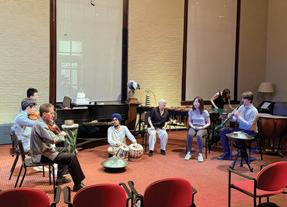
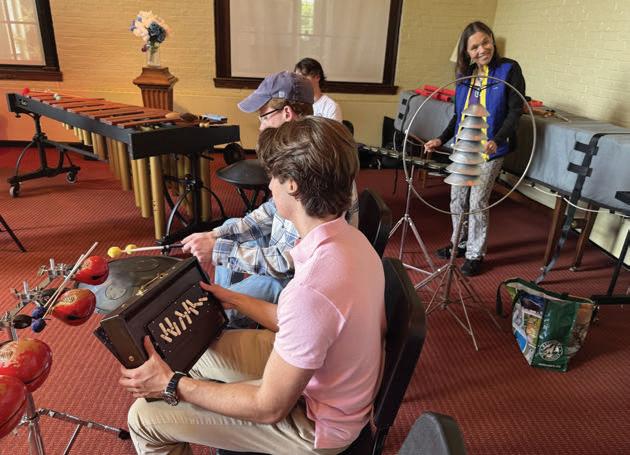
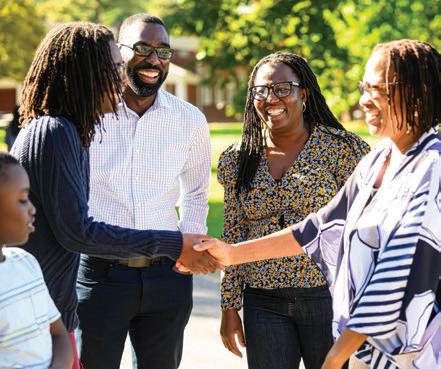
groton school once again opened the Circle to parents, siblings, and other family members for its annual Parents Weekend, October 17 to 20, 2024.
Perfect fall weather and the chance to catch up on everything that’s happening at Groton including academics, the arts, athletics, and more ma de it a special weekend for all.
Besides seeing their children, visiting parents were able to meet with their teachers and advisors, and nearly 2,300 conferences were held over four days. In addition, open houses and information sessions were offered with the Counseling and Academic Services, Spiritual Life, College Counseling, and Global Education Opportunity teams.
Friday evening featured a tailgate dinner before the varsity field hockey game against BB&N, a 3–1 Zebra win under the lights on the Field of Inclusion.
After breakfast and a Parent Fund meeting early Saturday, Headmaster Temba Maqubela gave his annual Parents Weekend address.
“Thank you to those who came from a few steps away as well as those from around the world. We appreciate your efforts to show up,” he said. “But today we are not travelers. We are neighbors: United in purpose, united by the children we love.”
Pointing to the work of Groton headmasters before him to diversify the campus by admitting minorities and
women, Mr. Maqubela said it showed the roots of diversity and inclusion ran deep at Groton.
“These are just two examples of the inclusion DNA that is on the Circle,” he said. “Inclusion didn’t start with us. We just had to find it and to know that it’s been there.”
In closing, Mr. Maqubela urged parents to continue setting good examples for their children.
“As neighborly neighbors, please continue to love more and judge less,” he said. “The value of a child should never be measured by what college they attend. So with humility, intentionality, and purpose, let us behave, folks. Let’s just behave and we’ll be fine. The children are all right. We’ll all be all right.”
Following the speaking program, families enjoyed a full schedule of athletic contests all over the Circle, before an evening reception at Sunset Farm and a performance spotlighting Groton’s young musicians in the Campbell Performing Arts Center.
Sunday started with brunch in the Dining Hall, before religious services for various denominations were offered in St. John’s Chapel and throughout campus.
More than 700 parents and family members took part in this year’s event, visiting from such places as Austria, Canada, China, Costa Rica, France, Hong Kong, Korea, Mexico, Netherlands, Saudi Arabia, Uganda, South Africa, United Arab Emirates, and the United Kingdom.
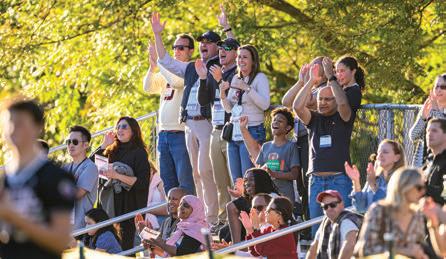
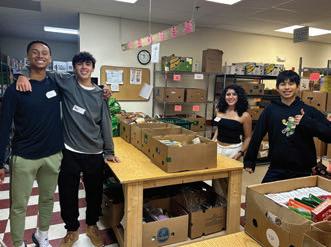
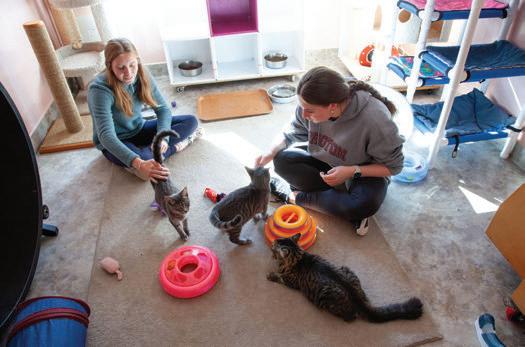
groton school’s October 15, 2024, Fall Day of Service shared some of the Circle’s special talents with residents of neighboring communities.
The event was one in a regular series of campus-wide volunteer opportunities designed to show students how their actions can make a concrete impact in the communities outside the Circle. Students had the day off from their regular school schedule and were given the chance to choose from twenty-five organizations in towns throughout the greater Groton area, including Ayer, Acton, Leominster, Lowell, and Nashua, NH, among others.
“Our goal was to try a different approach to community service and engagement by working with folks with a special skill set to bring to the greater surrounding communities,” said Director of Community Engagement Elizabeth Phan.
Toward that effort, Director of Theater Laurie Sales facilitated a storytelling circle involving Groton students and senior residents at the Nashoba Assisted Living Park in Ayer, designed to help with memory and remembering.

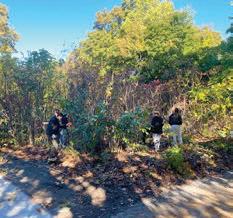
“This workshop was incredibly successful in bridging the gap across generations to find commonality and wisdom within each other,” Ms. Phan explained.
Similarly, Choir Director Dan Moriarty took choir members to the Groton Senior Center for a special performance.
“It was a true gift for both parties,” Ms. Phan said. “I would like to encourage more students and faculty to use their interests and passions for the greater good of all.”
Other opportunities included removing invasive plant species on nearby conservation land, maintenance of parks and playgrounds, food preparation at a local soup kitchen, and assisting teachers at pre-K centers. On-campus workshops focused on winterizing the Groton School community garden, building birdhouses for neighboring wildlife, and sewing washcloths and weaving blankets to be donated to a local migrant shelter.
“From reading some of the feedback,” said Ms. Phan, “you can see that the students truly learned about the value of giving our time and efforts to show up and help out as active community members.”
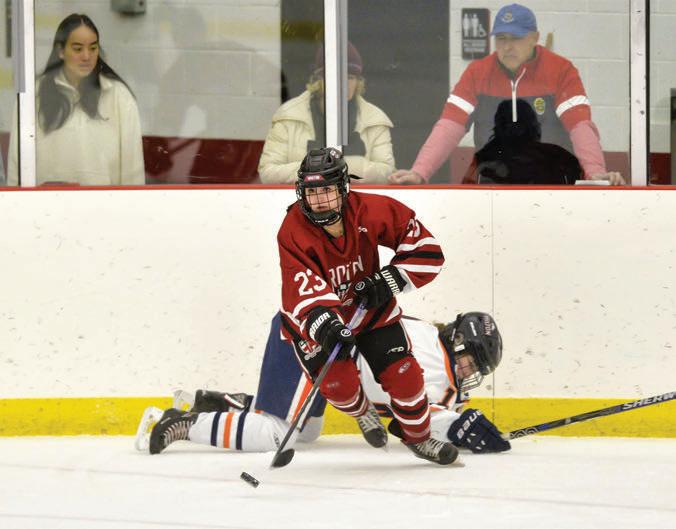
christina scalese ’26 was named to USA Hockey’s twenty-five-player roster for the U.S. Under-18 Women’s National Team that competed in the 2025 International Ice Hockey Federation Under-18 Women’s World Championship this past January in Vantaa, Finland.
The United States finished the tournament with a 5–0–0–1 (W–OTW–OTL–L) record, dropping the gold medal game to Canada, 3–0. Tina scored two goals and added an assist, and was named Player of the Game in a preliminary win over Sweden.
The U.S. roster included nine players from Massachusetts, four from Minnesota,
two from Illinois, and one from Alaska, Kentucky, Michigan, Missouri, New York, North Carolina, North Dakota, Ohio, Pennsylvania and Vermont and is made up of fourteen forwards, eight defenders, and three goaltenders.
“This has been a goal for her,” said Groton Girls Hockey Coach Tim LeRoy. “She’s always set high expectations for herself. And now she can say that she’s one of the best U18 players in the country.”
Tina played on the national U15 team last year and wanted a chance to compete with older players.
“She was determined to find a way back this year,” said Mr. LeRoy.
Tina was originally one of the last cuts made during team selection, Mr. LeRoy said. After USA Hockey management looked more closely at its roster, however, it felt her inclusion made for a better squad.
“It’s a huge thing for our program,” he said. “It’s awesome. And it’s also pretty cool that her teammates are so excited for her.”
The world championship tournament played from January 4–12 continued a special year for Tina. This past February, she became the first player in Groton girls hockey history to reach 100 points in a career.
new england patriots defensive back and punt returner Marcus Jones surprised the Groton football team Friday, September 20, 2024, at the start of practice with an informal get-together and Q&A session.
Mr. Jones urged the players to keep up on academics, take care of their bodies off the field with rest and recovery, and to believe in themselves, something that’s paid off for the third-year player. A 2022 first-team All-Pro in his rookie year, Mr. Jones
admitted his size he’s usually the smallest player on the field at just 5-9 and 185 pounds of ten has him playing with a chip on his shoulder. “I’ve got little-man syndrome when I’m on the field,” he said. “I play thinking I’m 6-5, 230.”
He also stressed the importance of being mentally and physically prepared, taking constructive criticism (“Listen to the message, not the tone.”) and embracing teamwork (“One player cannot make a team.”) before taking photos with players and coaches.

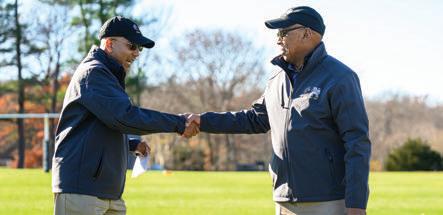
On St. Mark’s Day: Saturday, November 9, 2024
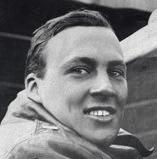
By Mac Coolidge ’75 and Ham Richards ’56
on thursday , November 7, 1918, our great-grandfather, J. Randolph Coolidge, recorded in his diary the announcement in the noon papers of “PEACE” in Europe. Already the Coolidges had been quietly, hopefully expecting their son Hamilton, a pilot in the U.S. Army’s 94th “Hat in the Ring” Aero Squadron, home to Boston for Christmas perhaps even by Thanksgiving g iven clear indications that the war was grinding to an exhausted end. And what a joyful occasion it would be. But there would be no homecoming. The next day, Pa strolled out early to see the papers ahead of the deliveries. Standing in the street, he read that Ham had been killed nearly two weeks before, on October 27, brought down by enemy artillery. Four days after he received this news, on November 11, the Armistice was signed, and the war was over.1
At Groton, Ham was Senior Prefect in the Sixth Form of 1915. He was captain of the football eleven, and a pitcher on the baseball nine. The great window in St. John’s Chapel, depicting St. George slaying the dragon, is dedicated to him.
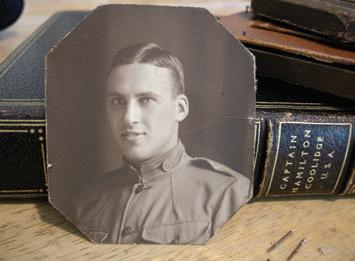
Ham’s letters home, particularly to his parents and to his older sister, Julia, and her husband, Henry Howe Richards 1894, reveal a young man of strong ethics, charm, warmth, and humor. He was a man of his times, of faith, sharing with his peers a robust keenness for the “cause” and willingness to consign to it his fate.
According to the War Department, Ham, as flight leader, had rushed to assist two observation planes under attack by six faster German Fokker planes, and targeted by artillery on the ground. In the account of Capt. Eddie Rickenbacker, Commander of the 94th, Ham had passed through repeated barrages intended for him, only to collide with an anti-aircraft shell that was not. He had been “one of the best pilots and most respected men in the American Air service,” Rickenbacker wrote in his memoir. Ham was 23.
He was initially buried in the cow pasture where he fell, at a bend in the river Aire near the village of Chevières, in the Argonne on the western front. His remains were transferred to the nearby Meuse-Argonne American military cemetery. But Ham’s parents, having purchased a small plot of land at the crash site, insisted on their return. Near the stone monument placed by his family, the engine block of Ham’s SPAD XIII remained embedded in the earth.
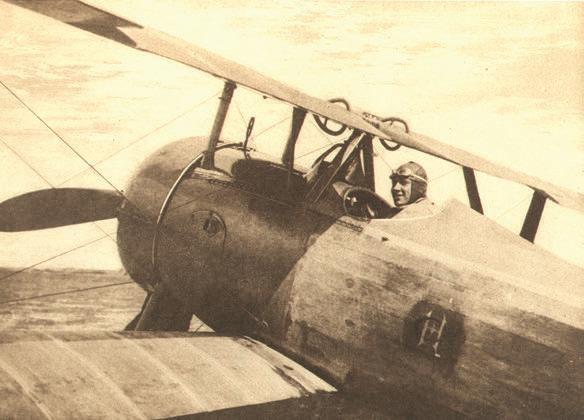
In the years following the war, Ham’s parents established a modest family fund that continues to support the village of Chevières in various ways including financing an annual Christmas party with presents for the young people. For more than 100 years, the village has tended the gravesite with care. Ham’s name is included, with those of villagers killed in the war, on a stone monument on the village green. The family has maintained contact with Chevières over the decades, annually receiving news and photos from the village Christmas parties, including a succession of mayors dressed as Père Noël.
At a gathering at the gravesite in Chevières in October 2018, marking the centenary of Uncle Ham’s death, members of the family and residents of the village confirmed that the grave and monument were plainly under threat by the ongoing erosion of the river bank. It would have to be moved again. A site adjacent to the small village cemetery was chosen, where the monument and its enclosure could be reestablished.
The 94th Fighter Squadron of the U.S. Air Force still call themselves the “Hat in the Ring Gang.” When they learned of the imminent reburial of their fallen brother, they readily accepted the village’s invitation to assist, and to join in remembering Ham. In September 2024, we gathered again in Chevières for a ceremonial reinterment of Ham’s remains at the new site, joined by forty members of the 94th, officers of the French military, and some 450 local residents.
The ceremony itself was dignified and moving. There were short remarks by the mayor, by a member of the family, and by the 94th’s commanding officer. Six pilots of the 94th brought Ham’s flag-draped coffin from the small chapel and placed it on a horse-drawn caisson for a slow, drum-beat march to the new site. A colorful bi-plane, reminiscent of the fighter Uncle Ham knew intimately, flew low overhead. With the coffin placed above the grave, members of the American and French militaries came forward one by one to choose a piece of metal from Ham’s aircraft, retrieved from the crash site, for reburial with the coffin. A bugler played taps. The six pallbearers
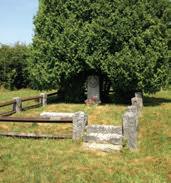
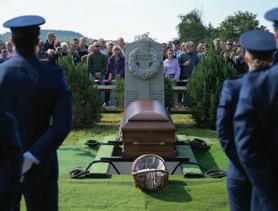
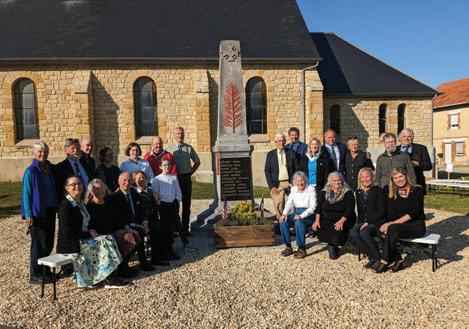
returned to the coffin, folding the flag with meticulous care and presenting it to a member of the family. Overhead, modern fighter jets flew the “finger four” formation, with one of the four breaking away, soaring vertically in the “missing man” maneuver.
In the evening, the village feasted us all in the “salle de chasse” (hunt hall), with wine lubricating the rusty French of some, for better or worse, in storytelling among new and old friends. These include several young people of the village who take a keen interest in the history of their region, and sustain the memory of our Uncle Ham. Remarks were given and toasts raised. A jug of local liquor of superior distinction was passed around. We
imagine that Uncle Ham would have felt truly at home. We are thankful to have reinforced the family’s link with the village, and feel honored to sustain this connection and fellowship across the ocean.
In addition to the hospitality of our French friends, the key participation of both the U.S. and French militaries was especially moving. Months before arriving on the village green of the small French hamlet, they helped conceive a dignified ceremony. With the village, they made it happen, embodying a visceral feeling of camaraderie with the fallen one of solidarity with all who have fallen in the cause of freedom from tyranny and the defense of liberty.
Started in summer 2016, GRACE combines a month of intensive academics with enrichment opportunities, giving rising Fourth Formers the tools they need to succeed in Upper School.
the
En rich prog ram — better known as GRACE — celebrates its tenth anniversary, we take a closer look at how this new summer t radition works to ensure the success of an inc reasingly diverse student body once it a rr ives on the Circle.
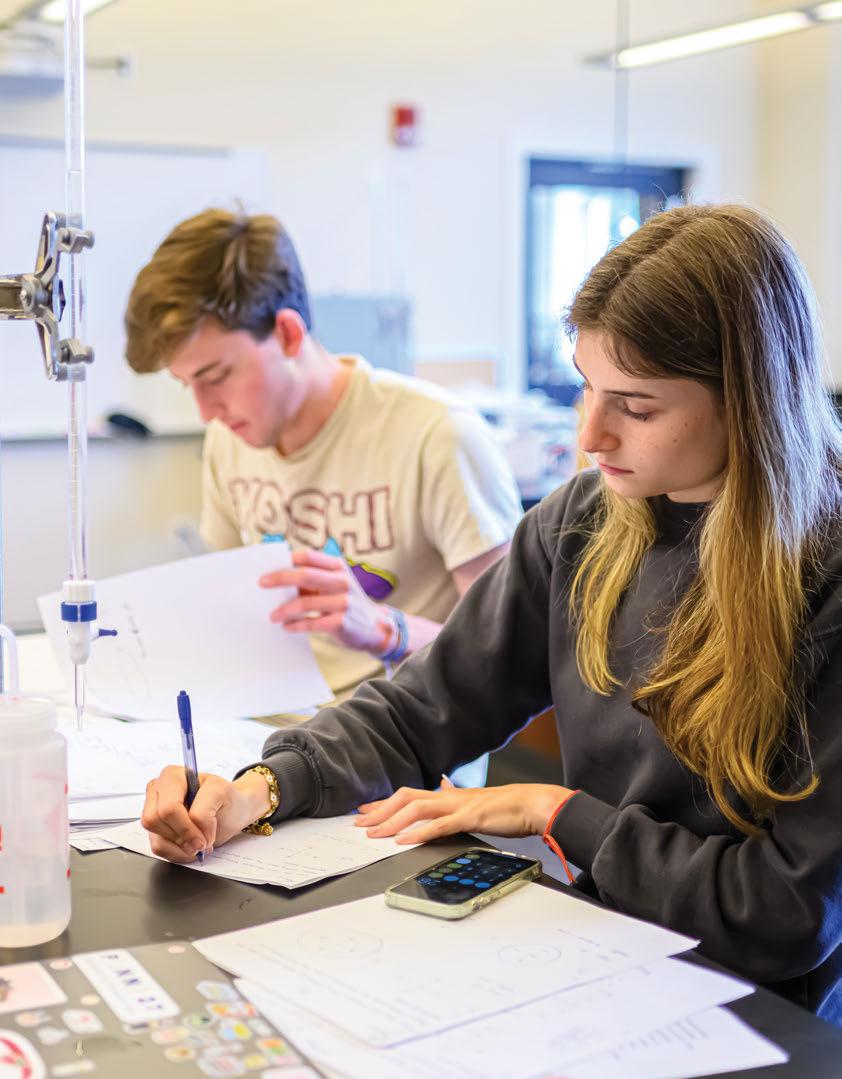
by Adam
this summer, grace the GRoton Ac celerate Challenge Enrich program wi ll celebrate its tenth iteration with a record enrollment of more than seventy scholars. Since 2016, this optional four-week program has helped prepare rising Fourth Formers for the rigors of Upper School by filling a preparation gap (called A courses), providing accelerated access to more advanced curriculum (B c ourses), or sometimes both.
“That’s the beauty of GRACE,” said Director of Enrollment Management Cort Pomeroy, who has also served as director of GRACE since 2020. “Because of the B c ourse element, the students that are going there for A courses don’t feel any stigma that they’re having to go to summer school to get caught up. The most popular course selection is one B and one A course. So you’re leaping ahead in one subject and getting caught up in another.”
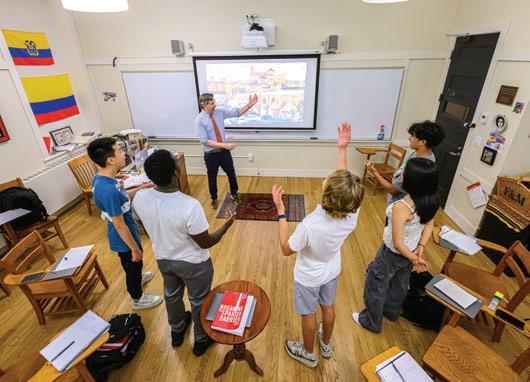
GRACE was the brainchild of Headmaster Temba Maqubela, modeled after a similar program he spearheaded during his time at Phillips Academy. In the spring of 2015, Mr. Maqubela tapped Associate Dean for Academic Affairs and Lathrop Brown Chair David Prockop to explore the idea of adapting the concept for Groton’s smaller student body and faculty size.
“I thought it seemed like a great idea, an intriguing project, but I wanted to make very sure and we did make sure every step of the way that the courses were owned by the departments, that each
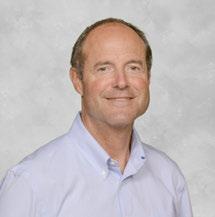
department was identifying what they wanted to offer,” said Mr. Prockop. “Buy-in was absolutely necessary. So I started going around to all the department heads asking, ‘If we did create a summer program, are there ways in which specifically students between Third and Fourth Form could benefit from the things that would be beneficial in your department?’”
A planning committee was formed, made up of representatives from interested departments English, science, classics, and math and the academic dean’s office.
“We started out with English just for supplemental writing support, science had A and B courses both off the bat, there was Latin A and B, and Math A and B, and that was it,” explained Mr. Prockop. “Of all those, Math B was the one that was taking the initial target audience and moving them forward, because the Math Department determined that it was very feasible to do the essentials of a whole geometry course in a summer term. And then those kids could go from Algebra 1 r ight into Algebra 2 , and off they went and they were on track from there to get through calculus.”
Once a schedule and framework was built out, it was time to approach the students. One key point of emphasis, as it is today, was that the program was completely optional.
“We got the whole Third Form together to talk about the program, and we really wanted to make the point that there was a huge benefit to the fact that students were only taking one or two courses,” said Mr. Prockop. “They’re immersed in that. It’s an academically focused program, they get a huge amount done, but the rhythm of life is a camp rhythm more than a school-year rhythm.
“Then we went around to teachers of Third Formers and their advisors to get them to recommend kids,” he added. “And then the teachers or advisors or I would follow up with a student just to say, ‘Hey, you’ve been recommended for this. Let’s just talk about what it consists of and I can get in touch with your parents if you like,’ but we’ve always made a real point of making sure that it’s through the student. The students are the ones who want to take the initiative and the student fills out an application.
“We certainly provide information when parents inquire, but the primary point of contact is the student because you never want a kid there who doesn’t want to be there, whose parents think they should, but the kid doesn’t want to be there because it really does take a lot of initiative from the student.”
Two members of that first GRACE cohort were Montanna Riggs ’ 19 and Brian Xiao ’ 19
“The program was pitched as an opportunity to dive deeper into subjects
I’d shown affinity for al most a fast track,” said Ms. Riggs, who graduated from Stanford University with a bachelor’s degree in bioengineering and music and a master’s degree in management science and engineering. She will be joining Alpine Investors as an investment analyst in September. “I’d initially started with Chemistry B and then also added Latin B. My advisor, [Vuyelwa] Maqubela, was a strong proponent of doing both. She really believed in me.”
Mr. Xiao, who graduated from MIT with a degree in physics and is pursuing a PhD at the University of California, Berkeley, took the same heavy load of two B courses.
“It was classes for most of the day, work for a lot of the afternoon and evening,” he said. “We became good friends, and I would say, all in all, it didn’t feel that bad at all because at the end of the day it was still Groton in the summer. Yes, a lot of work, but you just go to the library, you work with people. I personally enjoyed it quite a lot.”
Both said the coursework gave them a jumpstart toward further advanced studies.
“I remember being nervous about not knowing my academic standing at the end of GRACE,” said Ms. Riggs. “[Science faculty member] Dr. [Sandra] Kelly knows her stuff and thought I was ready. The second we hit the ground running in AP Chem that fall, I knew she was right. GRACE is not indicative of school. The pacing is off both in timeline and amount of time per day. AP Chemistry, although challenging, felt like a mountain I could climb by fall, and the AP exam as well.
“Organic Chemistry in Fifth Form with Mr. Maqubela was the highlight of my academic career,” she added. “Taking all core sciences at the AP level in high school set me up incredibly well in college, too. Freshman chemistry and intro orgo were a breeze compared to Groton.”
“Honestly, I think I really benefited a lot from it, because by the time I got to Upper School I was pretty serious about chemistry in particular, and that meant an accelerated chemistry path,” said Mr. Xiao. “If it weren’t for GRACE, I probably wouldn’t have been able to do a lot of the really interesting chemistry related work that I did later in Upper School.
“Getting AP Chem out of the way in Fourth Form meant that I could take Temba [Maqubela]’s Organic Chemistry class in Fifth Form, and I still think that class in particular was one of the most impactful that I took here. And then based off of that plus doing some tutorials in the Sixth Form year it really did a lot to shape my current interests in science. And I think I owe a lot of it, honestly, to that extra year of space that I had because GRACE shifted everything up.”
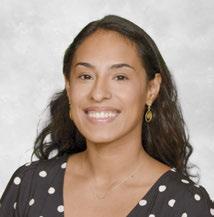
GRACE’s current director, Cort Pomeroy, started out as the program’s director of activities. He said the mission of the program meshed well with the school’s efforts to diversify the student body both demographically and socioeconomically through GRAIN, the GRoton Affordability and INclusion initiative.
“I was excited to do GRACE,” he said. “I do a lot of traveling where I’m pitching Groton to public school students, and I was aware of the fact that some kids come in with a preparation gap. So this actually has dovetailed really nicely with my work in admissions, part of this process of helping students to get caught up.”
One of GRACE’s distinctive features is that none of the classes is taught for grades. The focus, as Mr. Maqubela often says, is “GRACE, not grades.”
“That was Temba’s original vision,” explained Mr. Pomeroy. “I think the benefit is that students are able to learn for the sake of learning. That’s also why
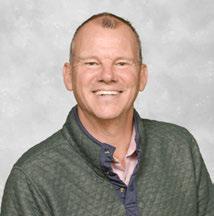
we call them GRACE scholars, because they’re kids who self-select to be here, where there’s not the benefit or the goal of getting credit. The benefit is that you’re learning and you’re improving.”
That benefit has resonated with Groton Third Formers, as GRACE participation has grown each year. The inaugural class had twenty-two scholars. By 2024, that number was sixty-one, and this summer’s class is expected to be another record. This has allowed administration to expand class offerings, especially in terms of A courses.
“The B courses haven’t changed,” said Mr. Pomeroy. “We’ve added more A courses: Modern Global History, a writing intensive, all the languages. As GRACE evolves, and we have more scholars, we can offer more.”
That expanded mix, in turn, opens GRACE’s appeal up to more students, he added: “I love that there’s no summer school stigma because you’re going to a program that most of your class is going to and it’s not something that is even though it’s working to get kids caught up it ’s not just for those kids.”
GRACE Director of Activities Carolyn Chica, who also serves as Groton’s senior associate director of admission and director of inclusion outreach, said the program’s success has become a selling point for Groton’s admissions team.
“From the admissions perspective, when I’m talking about GRACE, both parents and students are really attracted to the idea,” she explained. “I think the middle school student of today at least the ones
that are interested in Groton are really forward-thinking. They are looking for that challenge and they’re excited by the idea that Groton would help facilitate them in accelerating their studies.”
With Mr. Prockop planning a sabbatical, Mr. Pomeroy was brought on as director of GRACE in 2020. As with most things that year, GRACE was impacted by the COVID-19 pandemic. Classes met remotely, which was more of a challenge with a student body as global and a curriculum as hands-on as Groton’s.
“That was interesting,” said Mr. Pomeroy. “Creating a unique atmosphere online took a lot of playing with what worked, what type of these activities we were going to do. I think that the teachers and students by that point had been pretty used to Zoom sessions, but I think from an organizational standpoint ma iling science kits to everybody, for example, or finding Zoom times that worked for everyone it t ook some creativity.”
Rebecca Serodio ’23 was part of that 2020 GRACE cohort. She recalled how, after only a year on the Circle, having extra contact with her formmates even remotely ma de a difference.
“I remember just being in a class with a lot of people and doing super hard content was also just a nice way to keep in touch with everyone over the summer,” said Ms. Serodio, who is currently at the University of Pennsylvania in an accelerated master’s program for chemical and biomolecular engineering. “Even outside of the events that they did on Zoom, it was nice to be able to keep in contact and have a reason to reach out to people during the pandemic.”
As someone with no prior experience in chemistry, GRACE allowed Ms. Serodio to explore the subject without the pressure of grades.
“I was interested in chemistry,” she said. “I’d never taken a class before but I knew, as someone that liked science, I thought I should give it a try and see what happens. I wanted to get ahead, but also I knew it was sort of a low-stakes kind of thing. If
I wasn’t super successful at GRACE, nothing was going to happen. I would’ve tested into just a lower level of chemistry, which would’ve been totally fine.
“I was able to test into the AP Chemistry for the next year, and then I went on to take Mr. Maqubela’s Organic Chemistry elective,” Ms. Serodio added. “It ended up being a great experience just because being able to get that opportunity to take the more advanced classes was really nice, especially since sacrificing one summer for chemistry gave me access to the harder classes I brought in. And now, I mean, my major is chemical engineering, so I still do a lot of chemistry now in college. And being able to start earlier with GRACE and being able to focus on one subject gave me a great foundation.”
This past year, five of the nine TAs were former GRACE scholars.
“In some ways the most critical role is their ability to explain and clarify the material covered in class,” said Mr. Pomeroy. “So their strength in the subject area is hugely important. But then I, as the director, look at their softer skills. Are they going to be compassionate? Do they have good interpersonal skills and are they excited to work with young kids? They’re often already a Lower School prefect where they know the Third Formers, working with them closely. So in terms of skillset, I think it’s half subject knowledge and half your ability to work well with others.”
For Ms. Chica, working with the TAs harkens back to her high school years, when her first job in education was a similar position advising younger students.
In 2019, Groton Sixth Formers some recent GRACE scholars themselves were recruited to become teaching assistants (TAs), assisting faculty in the more challenging B courses in the summer after graduation. It was a tweak that helped advance the program to another level.
“It was a natural fit to have our own recent graduates who see themselves, and rightfully so, as much more advanced in one academic area or another, providing a bit of leadership to younger students,” said Mr. Prockop. “And at the same time, it’s different from just being a Sixth Form or a dorm prefect. We give them much more responsibility for class work and overseeing the younger students’ academic progress.”
“When I reflect back on my career as an educator, I see that moment of having been a teaching assistant as my first clue that education might be the career that I might eventually take on,” she explained. “And so a little part of me does hope that all of our GRACE TAs fall in love with education or always remember what their time was like as an educator here, because I think the profession . . . it’s an honor, it’s a science, it’s a calling. So I try to treat the TAs and their work with that same level of respect.”
TAs work with faculty members in the classroom with everything from copying handouts to running a lab. Some TAs who might be interested in education as a career could also take on teaching parts of the course, under the guidance of their
taing at grace was my first serious teaching experience and it prepared me for being a ta for physics classes while i was an undergrad.
brian xiao ’19

partner faculty member. After dinner, they monitor study hall and work with students who need extra help.
“I have found that the folks that do gravitate toward the role are really connected to the current Third Form,” Ms. Chica added. “They love the students that could potentially be at GRACE, and they’re excited about spending more time with them. They love Groton and they’re looking for any opportunity to increase the time on the clock for them here on the Circle.”
Ms. Riggs and Mr. Xiao were among that first batch of teaching assistants, and Ms. Serodio was a TA in 2023.
“It really forces you to master your subject in a way that you don’t unless you teach it,” said Mr. Xiao, who returned to Groton in 2023 as a physics teaching fellow. “Just the way you have to organize
your thoughts and all of that. And I do really enjoy working closely with students trying to guide them through all of the stuff that, as a student, I had to struggle through. It’s nice to see that you have that sort of impact on people.
“I would also say it did kind of plant that seed of teaching, since I’ve done quite a lot of the teaching in the five years since,” he added. “TAing at GRACE was my first serious teaching experience and it prepared me for being a TA for physics classes while I was an undergrad.”
Beyond the teaching experience, Ms. Serodio was interested in getting a chance to experience GRACE in person after her remote COVID summer.
“Just hearing about GRACE in a not-COVID year and hearing the stories and getting to be with your friends for the summer sounded really cool,” she said.
The inaugural twenty-two-student GRACE class from 2016. While still optional, participation has grown steadily each year, and this summer’s cohort will top seventy students.
“As a Sixth Former leaving Groton and with the GRACE program expanding so much to other subjects, I had a couple friends that were doing it with me and staying the summer, so we were all together. We thought we would get our own little experience, have our high school experience tied up with a little bow at the end. And I think being with people in my form and teaching a subject that I am passionate about and that I was about to go to college to study seemed like the natural decision to make.”
Shifting from student to teaching was difficult at first. When Mr. Maqubela told
Ms. Serodio and her TA partner Will Vrattos ’23 that they’d be leading off class one day with a ten-minute lecture on a unit they were working on, they figured it would be a lot easier than reality proved.
“That was my first teaching experience. It was definitely difficult at first. [Mr. Maqubela] said, ‘I’m going to come in a little bit late. You guys start class off with this.’ And I remember, that morning, Will and I sat down in front of a computer, did some Googling, went over whatever the textbook they used, took a couple notes and we’re like, ‘It’s ten minutes and we know this, so we’re just going to go up to the board and we’re just going to put what we know up there. It’s going to be great.’
“And I remember, because these kids have never seen this before, they started asking questions,” she added with a laugh. “So yeah, that was definitely our little test drive, very low stakes. But I think at that point we realized it takes a lot more preparation than we’d expected.
“But there’s also the more hands-on tutoring aspect of it where you get to
know the kids in the class. Our class was around fifteen to twenty kids and I got to know each one of them through office hours. They would come a lot and ask a lot of questions, and it was a learning curve for sure, but it was nice to be able to get to know all the kids and I would be rooting for them in the test. It was really, I think, heartwarming to see how hard they worked as well, just because they were always at office hours and always attending lectures and always paying attention. It’s really difficult to anticipate, if there’s a kid in your class who’s never seen this before, what question they’re going to conjure up and you have to be thinking on your feet all the time. So it was a great experience.”
important to create structure,” said Ms. Chica. “The structure that we have in GRACE strikes the perfect balance between similar policies and time blocks as a school year, but so much more freedom that I think the students feel good about it.
“The enrichment piece is very low stakes in the sense that there’s no JV or varsity that they’re trying out for. I purposely create the small group activities so that they’re what I would consider to be pretty relaxing, like board games or a cooking club.”
While GRACE is first and foremost an academic experience, the social and enrichment programs are hailed yearly as something that sets the program apart.
“Summer days are long, so it’s really
“In the summer, there is time in the day to take advantage of the area we live in,” added Mr. Prockop. “So we try to get out and spend time on the river, or take them to the beach, take them out to Western Massachusetts to go rafting. It provides the time to do more of that stuff than we normally don’t get to do during the school year, not only because of the class schedule, but also because in the summer we don’t have any sports or afternoon programs.”
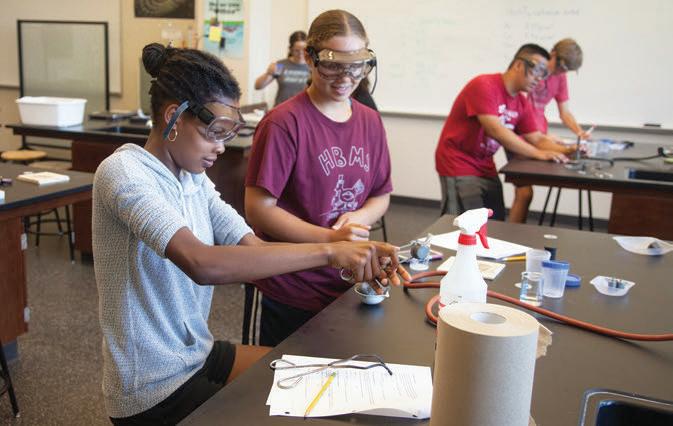
the structure that we have in grace strikes the perfect balance between similar policies and time blocks as a school year, but so much more freedom that i think the students feel good about it.
carolyn chica
Mr. Pomeroy said the social aspect of GRACE not only breaks up the academic rigor, but shows students a bigger slice of Massachusetts and New England beyond the Circle.
“When I was the activities director, it was smaller, so we went to Cape Cod and went to the National Seashore; we went to Boston to a comedy club,” he said. “So it was more of, ‘You’ve been living here for at least a year. Let’s show you some of New England.’ Now, we have an outing to Western Mass for ziplining and whitewater rafting. So I think exposure to different activities is important doing cooking club is another great example, or stand-up paddle boarding. It has this element of summer fun. And I think one of the reasons GRACE has grown so much is because it is fun.”
One highlight of the current GRACE enrichment program is an Olympics-style team competition. TAs each lead a team (there are eight to ten per summer, with seven to nine students per team) in a series of competitions tailored to current events or student interests, ranging from a mini World Cup tournament to an end-of-program talent show.
“The TAs are the captains of their Olympic teams,” Ms. Chica explained. “They all are instructed to generate a sense of identity and group good cheer. They make T-shirts, they strategize about the challenges. They help out in a big way in terms of safety and always give me good
feedback about things that have gone well and things that haven’t.
“Last summer, an entire Olympic team did a rendition of ‘Bohemian Rhapsody,’ and actually did better than expected. It takes guts to stand up and perform at a talent show, and so my hope is that the students come back from GRACE not only prepared for the academic piece of Fourth Form, but also standing up a little taller and maybe trying out open mic night or starting a new club.”
learning because of under preparation or different preparation coming to Groton and other kids who are looking to accelerate in certain areas. So having the combination of both of them for us wa s really powerful, and it quickly became something that we were really excited to support.”
The Karrs were not alone.
Since the Groton Board of Trustees instituted GRAIN (GRoton Affordability and INclusion) in November 2014, more than $100 million has been raised in support of the greater GRAIN mindset: Removing any barriers that prevent the school from attracting the most talented student body possible, and ensuring the success of those students once they arrive on the Circle. Of that amount, more than $90 million has gone directly toward tuition and cost containment the largest effort per student for financial aid by any boarding school in more than a decade including the creation of an endowment specifically for GRACE.
Sisters Alex Karr ’21 and Dani Karr ’23 are both GRACE alumnae. Their parents, Tonia and Adam, were key supporters of the program. Mrs. Karr explains that, as a former middle schooler who had no access to Latin classes, Alex wasn’t exactly enjoying Latin at Groton. GRACE was recommended as a way to reinforce the subject with less pressure.
“It was put to us as [Latin] is a class that seemed to be challenging for Alex,” she explained. “Her counselor said a lot of her peers have already been exposed to it in middle school, and they thought that she would just really benefit from reinforcing everything that she learned during the school year over the summer. I think that, from our perspective, anything that makes you a stronger student would be beneficial.
“When we learned more about it, how it’s for some kids who need to reinforce
Thanks to this support, and mirroring what was done with GRAIN, Groton was able to freeze GRACE tuition from 2022–24 and provide financial aid to any GRACE scholars who need it. As a result, all students regardless of their elementary or middle school background have the opportunity to enter the Fourth Form on more or less equal footing.
It’s just another example of how GRAIN has changed the makeup of the Circle, and of the Groton experience itself, allowing Groton to admit what Mr. Maqubela has termed the “missing middle” those families who either didn’t qualify for aid or, with the similarly increasing cost of a college education, never thought of independent schools like Groton as an option for their children.
Mrs. Karr said the GRACE experience served a number of purposes for her daughters beyond helping with Latin, including building confidence on the academic side, growing closer to their classmates, and getting comfortable with being away from their California home. Alex and Dani are currently students at Northwestern University.
“Hats off to Mr. Maqubela,” she said.
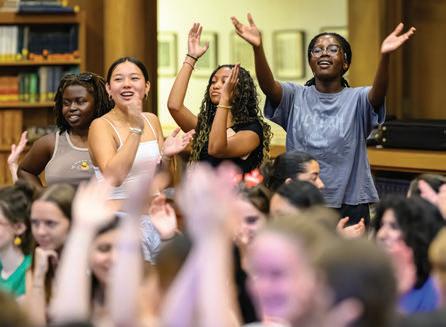
“Anything the Maqubelas are very excited about is something we’re happy to support. In the past, we have supported educational opportunities for kids broadly, so this just made a lot of sense for us.”
When COVID confined most of the world’s students to their homes for remote learning, it created a preparation gap for many of those children that still exists today. A 2024 study from the Education Recovery Scorecard a collaboration of the Center for Education Policy Research at Harvard University and the Educational Opportunity Project at Stanford University ex amined math and reading test scores in grades 3–8, in about 8,000 school districts across thirty states from 2019 to 2023. It found that pandemicrelated academic achievement gaps not only remain but have worsened in some states, including Massachusetts.
Mr. Prockop said he can tell which math class current students would’ve been taking during COVID based on the work he sees in his physics class. Having GRACE to close any of those pandemic preparation gaps gives Groton a proven way to address what many schools are still scrambling to fix.
“Last year, it was really clear to me,” he said. “There are kids coming in with pre-existing preparation gaps and GRACE is this existing structure now
that can be used to try to fill those gaps as much as necessary.”
Beyond leveling the playing field for Groton’s increasingly diverse incoming student body, GRACE has shown it works at bringing rising Fourth Formers closer together and to Groton, and to giving them the opportunity to explore academic pathways that might otherwise not have been available.
“From the very first year, it’s been amazing to me how well the retention goes st udents’ retention of the academic material,” said Mr. Prockop. “That was one thing we were keeping a really close watch on: When we were going to get
all this done in such a short time and then you go away for the rest of the summer, does it really stick with you as well as if it had been spread out over the year? And it really seems to have.”
“In all the tracking that we’ve done, there’ve been very positive results both in terms of grades, but also in terms of students’ engagement and confidence in what they’re doing in the classroom,”
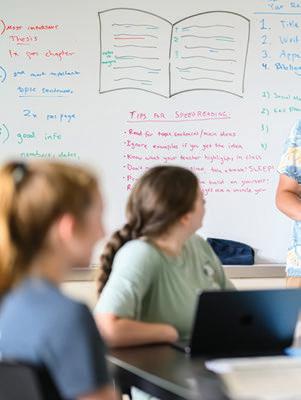
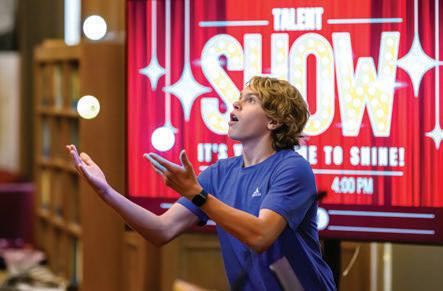
he added. “And then the course placement element has made a big difference. Any kids who are in Algebra 1 have the capacity to get through Calculus. AP
Chemistry has become almost entirely a Fourth Form course now. There used
Below: Post-grad teaching assistants work with faculty members in the classroom, and run study halls and extrahelp sessions after dinner.
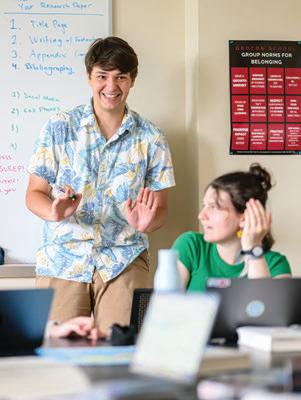
to be almost no Fourth Formers in it. And in fact, in that one in particular, even before GRACE started, Sandy [Kelly] was overseeing some kids doing independent online courses in the summer and then taking tests at the end to try to get into AP Chemistry early. Some kids still do that, but the ones who come to GRACE tend to do much better in AP Chemistry. The in-person course really does have an a dvantage.”
Greater access to advanced Latin is another GRACE success story.
“You can see on the Latin side how this has been a huge shift,” said Mr. Pomeroy. “The students who come in with experience in Latin are either coming from a private
school or a very advanced wealthy public school community because a lot of public schools don’t offer Latin. So if you came to Groton without having taken Latin, it would’ve been impossible to get to Latin 3 in Fourth Form without GRACE. So that’s really helped with the number of kids that can now access AP Latin.”
Ten years in, Mr. Pomeroy said the great majority of student feedback and surveys show that the GRACE experience is well beyond that of a typical summer school.
“Kids will often say that this is one of the highlights of their time at Groton,” he said. “Academics are primary and I think all the students would attest that they did work hard. But I think the combination of having the campus pretty much to themselves and participating in these activities adds a valuable element of summer fun.”
“I think it’s all the time spent together. In the school year, in the winter, you might be playing hockey and your friends are playing squash. So you’re doing different things in the afternoon. But in the afternoon at GRACE we’re all playing capture the flag, or we’re all going whitewater rafting or we’re all going to the movies. During the school year you have different lunchtimes. At GRACE,
Below: While GRACE is first and foremost an academic experience, the social and enrichment programs are hailed yearly as something that sets the program apart.
we’re all eating together. So I think it’s that collective group time together that I think really helps to deepen that bond.”
Mr. Prockop believes GRACE amplifies the benefits of Groton’s small size into an even greater strength.
“You have the benefits of an even smaller, more cohesive social group,” he said. “You have even smaller classes, so you get even more attention from teachers and TAs. I really do think it provides the benefits of a small school, but exaggerated.”
“I’ve explained this to people before and they’re kind of in awe that freshmen in high school would want to go back to school for a summer and take classes,” said Ms. Serodio. “And so usually what I say is that Groton has a pool of kids who are really motivated and talented and really want to get better in school, but also it’s a great place to kind of grow up in and do the activities and do what is outside of class.
“It goes beyond the academic component,” she added. “It really got me closer with my friends in my form. The work and the time that you spend doing the actual course content and stuff like that isn’t so bad when it’s summer and you’re with the people that you’re friends with.”
“I can’t believe it’s been ten years,” said Ms. Riggs. “I don’t remember much of the specific coursework, but rather the time spent on campus, just the twenty of us in the hot summer sun. Campus was ours for a month.”
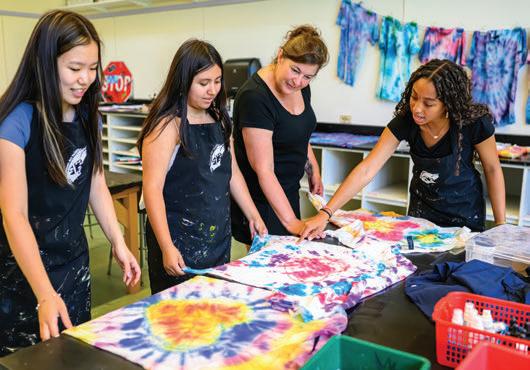
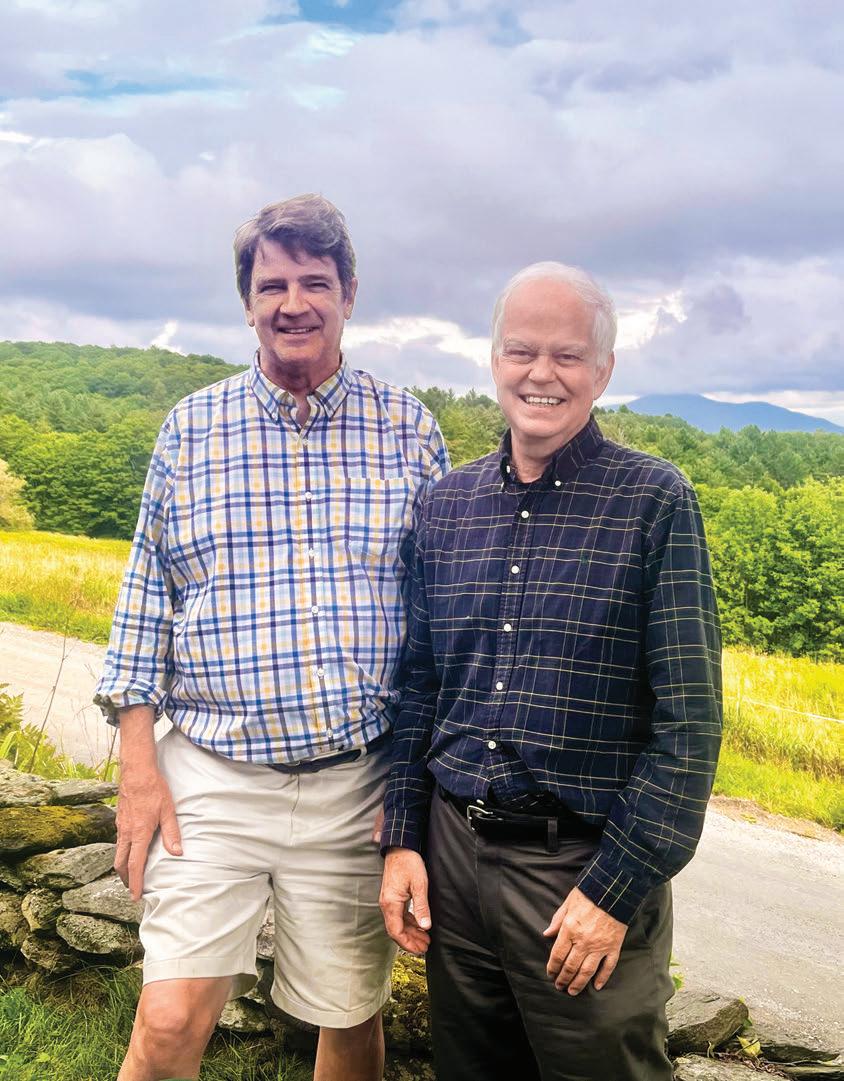
By Sean Kerrigan
robert gannett jr. ’68 believes in the power of community.
Gannett has worked as a community organizer in Chicago since 1972, helping residents of his adopted home address such issues as redlining, property value protection, affordable housing, local school governance, and the absence of after-school civics programs for middle school students.
As executive director of ICE the Institute for Community Empowerment he’s worked with city leaders, colleagues, and partner organizations to help draft and pass the Chicago School Reform Act of 1988, the Home Equity Assurance Act of 1988, and the Community Expanded Mental Health Services Act of 2011.
And, this past November, another passion project of his the Coalition to Save Our Mental Health Centers notched one of its biggest success stories yet: By an overwhelming margin, they convinced members of two Chicago neighborhoods to raise their own taxes in support of locally controlled mental health service centers.
Now he’s working with a group of Groton School formmates and friends on a capital campaign that will help the coalition take its work to even more Chicago communities, one door knock at a time.
“I just marvel at the courage, the sophistication of regular people in these neighborhoods when they’re given a chance to do something important where they’re addressing their issues and they’re not waiting for somebody in the government to tell them what to do,” Gannett said.
The Sixties were a turbulent time, especially for high schoolers and, like many of his generation, Gannett quickly became interested in making the world a better place. He was there when Martin Luther King Jr. spoke on campus and became deeply involved in the Groton-Lowell Upward Bound program, working with low-income, high-potential and high-risk students from nearby Lowell, MA, during the program’s first years.
By that time, Robert Sr. had served eight years as a Republican member of the House of Representatives in the Gannetts’ home state of Vermont (he would go on to also serve as a state senator). Gannett loved the Green Mountain State, but felt pulled to a higher calling.
“I could have stayed in Vermont but I said, ‘No, there are no urban issues here. I’ve got to find someplace to really become engaged in trying to address some of these pivotal issues that our country is facing,’” Gannett explained. “So I volunteered for the McGovern campaign for president in 1972. I went to Chicago and, in a way, the rest is history. I was there on a bus going to a downtown rally for McGovern, and I sat next to one of the very first community organizers. He said, ‘Bob, do you have an idea of what you’re going to do after the campaign?’ And I said, no, so he said, ‘Well, I have a community group on the southwest side that you could talk to,’ and I’ve never left it. So that was the start.”
Gannett’s maternal grandfather, Richard Derby, was a member of the Groton Form of 1899. His father, Robert Sr., was a Milton man but his mother Sarah’s love of Groton brought young Robert Jr. to the Circle.
“Groton was an extremely important school to my grandparents, and to my mother,” he said. “My father had been at Milton, so he had to surrender, but Groton seemed to have been the right spot for me, and it was.”
In 1963, President John F. Kennedy signed the Community Mental Health Act, providing federal funding to build community mental health centers throughout the country. Throughout the Sixties and Seventies, Chicago used that funding to develop a network of nineteen centers that provided nearly all the city with local access to mental health care.
As federal funding was scaled back in the 1980s, however, cities like Chicago were left having to fund the centers themselves and, in 1991, Chicago Mayor Richard Daley began to shutter the city’s centers. The Coalition to Save Our Mental Health Centers was born.
In the years since, the group developed a community-centered model for providing mental health care, and helped pass the Community Expanded Mental Health Services Act in 2011, allowing any community to create an Expanded Mental Health Services Program, or EMHSP for short.
The plan, Gannett said, was to convince local voters to pass a new levy that would raise their property taxes by a small amount about 0.025 percent of property value, or around $20 a year for an average homeowner to f und centers in their neighborhood. Despite the need for mental health services and the past success of local care centers, not everyone was convinced the plan would work.
“I was told by an alderman in Chicago whom I knew, ‘Bob, nobody will ever vote to raise their property taxes.’ And I said, ‘Well, watch us do it.’”
And do it they did. Working with young people from the communities in play, the coalition knocked on doors, handing out brochures and explaining to their neighbors how this issue impacted them and their families. Ten thousand signatures had to be gathered just to get on the ballot, and many more supporters needed to be earned in order to get the initiative passed. While Gannett leans to the left, he still draws on his
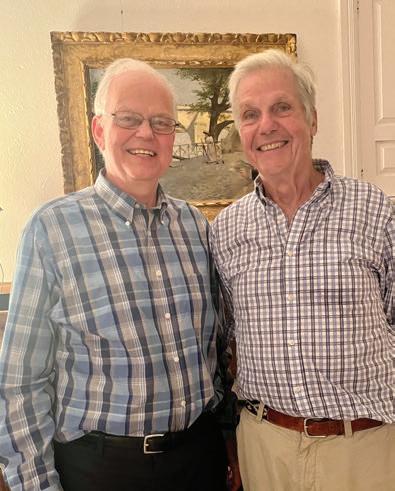
father’s influence and always builds bipartisan support. All are welcome in this coalition.
In November 2024, voters in one Near Southwest Side district stretching from Bridgeport to Little Village and another district centered on Englewood and Greater Chatham approved the new levy by margins of 79 and 91 percent.
“We’ve had great success,” Gannett said. “It all happens outside the traditional framework of the city government, where the tax money does not go downtown, but instead to commissions that are set up to oversee the mental health programs. And since one size does not fit every community in Chicago, we tailor each program to what the people in that community think is most important for them.”
Like Gannett, John Tilney Jr. ’68 cites Groton-Lowell Upward Bound as a formative experience from his time on the Circle. After graduation, Gannett went off to Harvard, and Tilney Columbia, but their paths kept crossing. One of Tilney’s first projects as an economic development specialist happened to be developing strategies in Chicago and, thirty years later, when his wife Cathy’s firm decided to close its Chicago office, he went along for the trip.
“I went out with her and also chatted with Bob, and he said, ‘Well, we’re just about to set up this first center and we could use some furniture,’” said Tilney. “So she donated the office furniture to one of the first centers out there. I had discussed the model with Bob and so did Cathy. We were intrigued, and it was for us having worked on urban issues all of my life I knew that mental health services were a big issue and a lot of people weren’t getting the support they needed. To me, this just sounded so exciting because it was a way to fund those services in a way that couldn’t be taken away by the government.”
The community-centric structure of the program also appealed to Tinley.
“I love the model that it was community development as well, because they set up these boards, they’d get the local people to run them, and they’d train them,” he said. “They’d not only manage the health centers, but they would also get involved in a lot of the other issues in their particular neighborhood. So it was a great community-building effort.”
At this time, the coalition had little to no fundraising infrastructure, so Gannett asked Tilney to help with what would become the “Vision 2030” capital campaign.
“We were very excited and agreed to make some initial donations. And then Bob said, ‘Well, we’re going to form a leadership council, so maybe you’d like to join?’ I said, sure, I’d be pleased to. So I’ve been involved really since the beginning of the campaign.”
Hank Slack ’68, P’01, ’05, FTR’85–’99 and Gannett were great fr iends at Groton and have remained close ever since. While Gannett moved to Chicago, Slack’s career in the natural resources
field brought him to South Africa and London for nearly thirty years, before he returned to New Jersey in 2000. So when Gannett approached him about joining his fledgling capital campaign’s board of advisors, he agreed, not knowing exactly what he was signing up for.
“My sole connection with Chicago and with this fantastic undertaking is through Bob,” said Slack. “I’ve followed his career with interest and always been impressed by what he has done in a quiet, exceedingly humble way for the benefit of many others in Chicago.
“When he came to me a couple of years ago, I emphasized that I didn’t know how much I could help, but I was certainly keen on what he was doing. And I’ve become even more enthusiastic since becoming involved. I mean, I’ve now been to Chicago a couple of times solely for this reason, and I’ve traveled with Bob a bit on fundraising efforts. The more exposure I get, the more enthusiastic I become.”

The success and scope of a project that grew from such humble beginnings and simple methods as knocking on doors gives Blaine optimism in a time when the world needs some.
I was told by an alderman in Chicago whom I knew, ‘Bob, nobody will ever vote to raise their property taxes.’ And I said, ‘Well, watch us do it.’
BOB GANNETT ’68
Jamie Blaine ’63 was in Sixth Form when Bob Gannett arrived on t he Circle as a First Former. They didn’t interact much during their overlapping year, but as alumni with the same reunion years who shared similar interests, they grew closer as time passed. When Gannett reached out a few years ago to gauge his interest in serving as a campaign advisor, Blaine agreed.
“Bob was there in 1963 as a First Former when Martin Luther King came, and I think that was a very galvanizing time for me and also I think for him,” said Blaine. “He went on and got more and more involved in the Civil Rights movement after that point, and I’ve always been interested in community organizing and social justice. So he called me it was out of the blue and said that he had been putting together this project and he wanted to put together a council, and would I be on it? I said, sure, not knowing really what it was or what he had been doing other than very broadly. I began learning more about what he was doing, and I got hooked.”
“The fact that these kids come out in the summer and go door to door in South Chicago does give me hope,” he said. “Because you’re asking these impossible questions: ‘Would you vote to raise your taxes? In a bigger picture, would you be willing to take this on for all the time that it’s going to take to get it done?’ And people respond, not just affirmatively, but enthusiastically. It’s not easy. I mean, Bob didn’t find a magic wand. It’s been a lot of plugging.”
The Near Southwest Side and Englewood districts are the seventh and eighth areas to approve a community mental health center tax levy. Their centers are expected to open in 2027. The campaign is closing in on its $5 million “Vision 2030” goal, and Tilney, Slack, and Blaine all mentioned they’d love to see similar grassroots programs brought to other cities.
“If this works in Chicago, which it does, I think there’s a real prospect of this being duplicated,” said Slack. “I’d love to see it duplicated, for instance, in Newark wh ich is close to me or i n Camden, NJ, or in Philadelphia. I think there’s a real possibility that this can be replicated elsewhere, and that’s what I find also very exciting.”
Gannett, as always, stays focused on Chicago and getting his neighbors more involved and invested in their community.
“To me, the work I do, it’s finding ways to strengthen this system of government we live in,” he said. “It’s called democracy. And I like the concept that, if you get people involved in their communities addressing their problems, they suddenly have a stake in democracy. They’re not observers, they’re participants. And they love that. It goes back to what I started by saying, watching how people in the community respond to our work is why I’m still at it. It’s been really exciting.”

By Zach Baker ’25
November 12, 2024
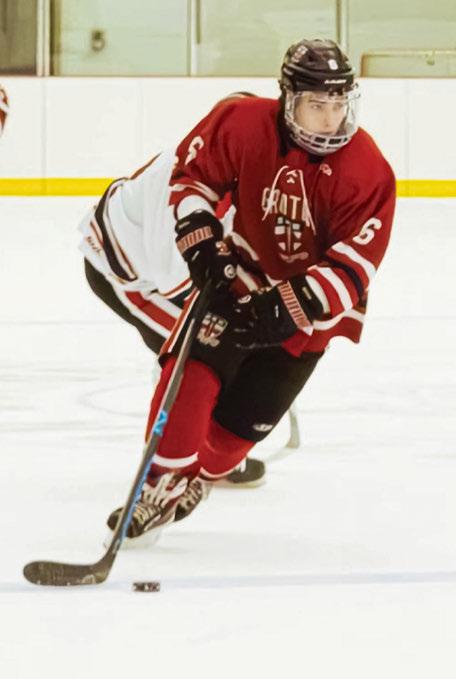
while i was writing this talk , I considered going in a couple of different directions. I thought about having something written before the election was called or completely disregarding politics, but after a lot of staring at my ceiling instead of going to sleep at night, I’m not going to stand up here and pretend like I wasn’t shocked and crushed when I woke up Wednesday morning and saw that New York Times notification on my phone. Regardless of what side of the aisle each of us is on, we were all affected by the results of the election, so I’m not going to ignore the situation we find ourselves in. Sure, some of the sentiment from last week might have died down, but come January and the inauguration it will be back.
At this point in the year, most of you sitting here probably know that I am a Democrat. If you don’t, well, the secret’s out. In general, I tend to be very open about my political beliefs, especially this fall between all the Young Dems meetings we’ve hosted and the fact that I openly drive a Subaru. But as much as I would love to spend my time up here diving into my stance on every little issue, I think this is a time when our personal views need to be put aside, and all of us, including myself, need to take a step back and remember who we are.
The truth of the present moment is that we live in a divided country. This includes international students, too, as they will be here for at least the next four years at Groton and likely at college. The last two times we faced a rift comparable to this one, all of the disunity and strife ended in violence. In 1861, it boiled over into the bloodiest conflict in American history. A century later, peaceful civil rights activists were arrested, beaten, and lynched en masse. It has been generations since hatred toward our own brothers and sisters around the United States has
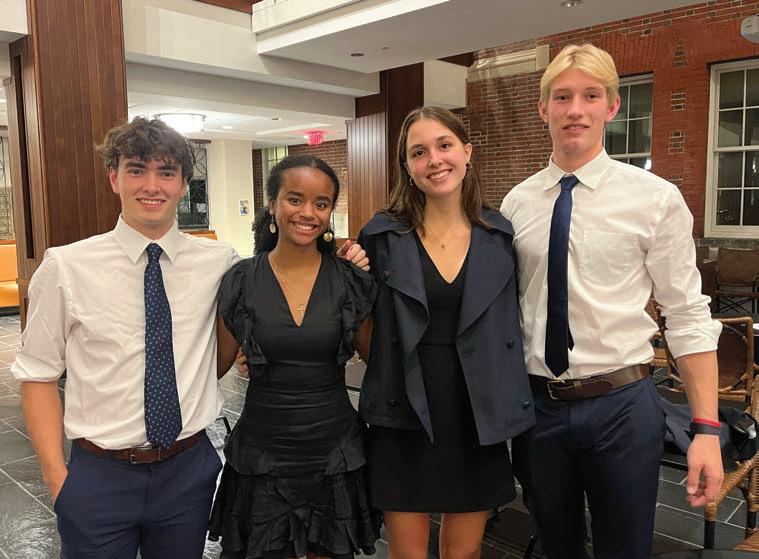
flowed as freely as it does now. The reality is all of us in this chapel will be part of whatever our nation faces in the coming weeks, months, and years; there is simply no avoiding it. And, because we are a part of it, we have the unique opportunity to shape it.
Though individually we have little control over who makes our laws and decides our policies, we do have complete agency over ourselves and how we want to model our community. For those of you who support Kamala Harris, you have a right to be angry, sad, worried, and uncertain about what comes next.
For those of you who support Donald Trump, you have a right to be happy, excited, and hopeful for the future. With such polar sentiments surrounding us on a campus as small as ours, though, it’s easy to let emotion get the better of us and dictate how we act. Trust me, I know: any mention of politics over the last week has sent me to the verge of crashing out.
Yet, we also all have, as our beloved hockey coach Earl Cronan loves to reiterate (a lot), the right to do more. Attending this school has equipped us with the tools and abilities to bring significant change to any environment we find ourselves in, whether that’s here, back home, in college, out in the workforce one day, or anywhere no matter where we are in our lives or
in the world, we have the potential to work alongside one another to revamp anything.
So, I want to bring this back to our lives right now. Every single one of us has to make a choice. What do we want our school, our relationships, and our lives to look like? From this moment in history, there are two paths we can choose to go down. First is the path of bitterness and animosity. We can spend our time here in loathing, refusing to integrate with those who disagree with us, and deepen the divide by making the conscious decision to value other people based on their ideology not for who they are as human beings.
Now, I know what you’re all thinking: that is obviously the wrong path. However, not walking down it is not as straightforward as it may seem. Sometime in your life, you will inevitably have a conversation with someone about a topic regarding one of your fundamental beliefs and you will never find common ground with the person on the other side. When that moment comes, you will be upset, and you will be confused, and that is OK.
You still have a choice to make, though. You can try to counter them, argue, do whatever you can to convince them that they’re wrong and you’re right. Or, you can listen.
All of us share the common goals of pursuing happiness and building a more just, equitable, and flourishing society.
I can almost assure you that their beliefs are just as strong and as deep-rooted as yours. In this age of information, where everyone can know exactly what is going on anywhere in the world at any time, people simply have their minds made up, there is no changing that.
So all we can do is try to understand, which leads me to the theme of the second path: treating each other with dignity and respect. It’s human decency. Yes, choosing this path is very challenging, to say the least. It’s hard to ignore the twist in your stomach that comes when you hear something you so vehemently disagree with. But, when has anything worth doing ever been easy?
Our generation is free to reject the divisive rhetoric that has become so acutely pushed onto all of us by the media and politicians. Yes, it is a monumental task and one that will take years, likely even decades. Yet, it was just another Groton kid who led the United States out of the Great Depression, arguably the most trying time in the history of our country. If he could do that, why can’t we do this?
Now, I want to make it clear that I am not saying that you have to be friends with people you disagree with. Each of us honors our own principles and values. But we don’t have to manufacture vicious enemies of one another. All of us share the common goals of pursuing happiness and building a more just, equitable, and flourishing society. While we may have different ideas for how to reach those, we need to recognize that we are far more similar than the media and those who try to divide us want us to believe.
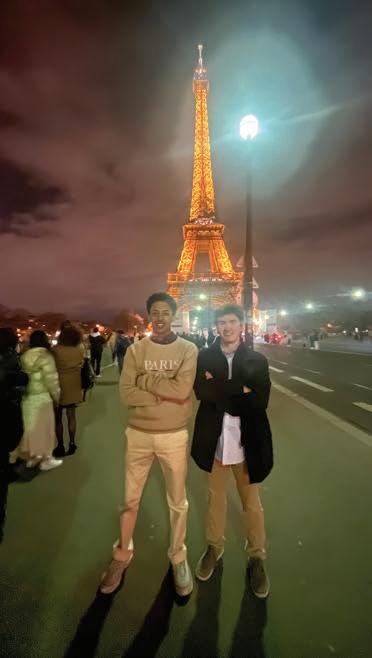
Our disagreements are what fuel our democracy. Frustrating as they can be sometimes, especially within the various branches of the government, our disagreements require us to come together to talk and to compromise. And if we can bring ourselves to do those things with an open mind and good intentions, then we are on the right path.
No matter what state our country or our world is in, each and every one of us has the talents we need to bring about meaningful change, and there are many others out there just as prepared as we are. This is bigger than all of us. So, it is up to us how we bring ourselves, our knowledge, our privilege, and the principles and values that Groton instills in us to shape the world as we see fit and make it a better place for everyone. In my not-so-unbiased opinion, that starts with choosing the path of dignity and mutual respect.

A CHAPEL TALK
By Jennifer Polynice ’25
September 17, 2024
for those of you who don’t know me very well, I was born on December 20, 2006, in Newark, New Jersey, and my full name is Jennifer Renee Polynice. My grandmother and I have the same birthday, other than the fact that she was born in 1948. My favorite colors are teal and hot pink. Everything makes me laugh. Sunsets and warm breezes make me happy. I’ve always believed in second chances. I’m in Sixth Form, I’m almost 18, and my mind is always racing.
I’ve been thinking about the sun a lot recently and how it’s the heart of our solar system, not just because it anchors us in the vastness of space, but because it breathes life into every living thing. It whispers into the ears of flowers to bloom and trees to grow, ultimately setting the rhythm of life that we so often take for granted. Its power is insurmountable, yet it’s also humble in its regularity. No matter the darkness of the night, the sun always returns, reminding us that even after a life spent in the shadows, there is always a new beginning. Always another world on the horizon. Ask me about the sun and I’ll tell you about how it’s never forgotten me, even when I have lost myself.
This past summer, I went on a GEO to South Africa with seven of my peers, several of them my closest friends, and our fav Mama Vee, aka Mrs. Maqubela. One night I found myself comfortably sitting, with Senior Prefect Kate Bartlett to my left and South African student Asanda to my right, and a plate of food in front of me. A few moments after we settled in, Kate and another Groton student, Margaret, got up to use the restroom. I’m not sure exactly when it started to happen but I had begun to drift away from the table.
It wasn’t until I had heard the silent whispers of my name that I had come back. It was Joseph, a friend from South Africa.
He had been calling my name for some time and was having trouble getting my attention. When I apologized for zoning out and asked what he was trying to tell me, he was quiet for a second before asking, “What were you thinking about?”
He scooched a few seats over, poured a heap of salt into Kate’s tea because he thought it’d be funny and asked me the same question again. Only this time, he was demanding an answer. “What were you thinking about?”
I didn’t really know how to respond because, if I was to be completely honest, I don’t think there’s ever a time where my mind isn’t a million places at once. Ask me what I’m thinking about and I’ll tell you the past, the present, and the future.
I desperately scrambled through my bag for my phone to answer Joseph’s question, giving him a glimpse of what and who my mind was on.
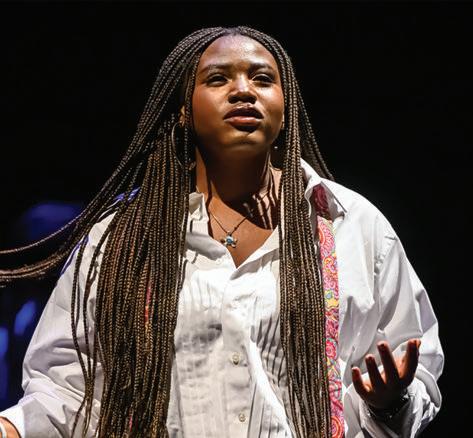
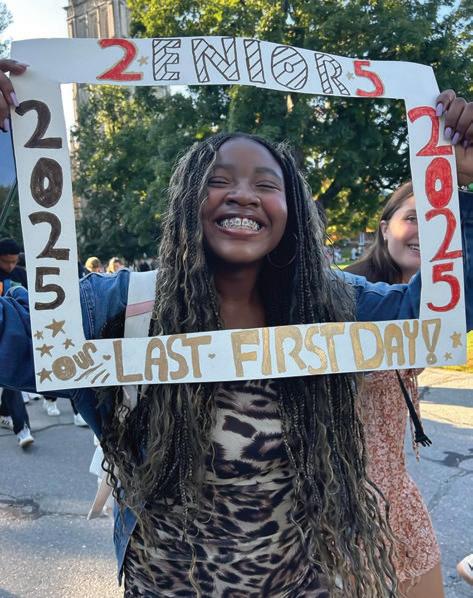
I opened Instagram. Not on my main account. But a more private, spam account, where I like to post miscellaneous photos and videos. Here’s a glimpse of what’s on it:
• A video of the time Lola and I had a mishap and found our dresser slipping down the stairs of our loft.
• A video of me calling former bio teacher Mr. Belsky “Mr. Beaker” after breaking a glass he specifically told me not to break.
• The video project I made with friends my Fourth Form year; friends on the Monkey app, frolicking on game days during winter term or even performing an array of songs by Drake in the C PAC.
• Oh! And Sixth Former Alicia Ye almost burning the dorm down by putting a bread pan in the microwave.
• And the list really does go on
From what I’ve learned, memory works like a filter, keeping the things in there that it wants based on how relevant they seemed at the time, usually
No matter the darkness of the night, the sun always returns, reminding us that even after a life spent in the shadows, there is always a new beginning.
because they caused some strong emotion, while simultaneously letting go of the random or mundane details that don’t really resonate with us.
It was the spring of Third Form when I really started to care about memories. Dealing with loss in my personal life had made me hyper focused on how fleeting life is. How we can lose everything in an instant without any warning. This thought haunted me to make a place where I could store memories forever. Even the most dull moments. So I started taking pictures. Lots of them. And whenever I missed someone or Groton, I found myself going back to the moments I had captured. And somewhere along the way it clicked how much I genuinely struggle with letting go. I was mourning for people standing right in front of me.
During this time and for a while afterward, when I experienced fallouts, I found myself in negative thought spirals, asking myself over and over what if I just handled the situation better, what if I had been a better friend, what if I had just stayed quiet. I would look back at my photos and the memories where the

current problems didn’t exist and I would wish with all my heart to go back. I had begun to live so much in the past that I couldn’t focus on the gifts that the present was giving me so freely.
Trapped in the belief that I couldn’t lose anyone if I photographed them enough, I had started taking many, many pictures. But it is true, isn’t it? That no one is lost as long as you remember them. And yet, I was afraid of losing the people I cared about. There’s not a beautiful way to explain that. What do you do when you’ve done all you can to save a relationship that’s not working? When is it OK to let go? How do you tell your friends and the people you’ve grown to love that they’re your sun? That you just don’t know if your universe will be able to function without them?
It took me a long time to realize that I don’t need to get swept up in scenarios that don’t exist and haven’t happened. I have the ones I care about in the here and now, and that’s more than enough. I realized that even if they do leave, the right people have a way of gravitating back to you.
I think the hardest lesson I’ve ever learned is that we have to let go.
That life is better without bruised palms gripping onto the past.
That I don’t need to leave claw marks on everything I’ve loved .
I’m still trying to perfect the last one.
I’m far matured from the girl who made her spam account in Third Form, but I can still say that a part of
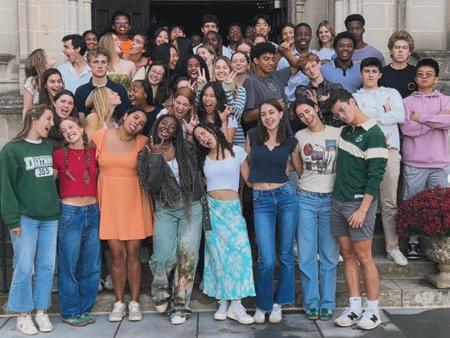
Top left: Jennifer on Senior Last First Day.
Top right: Jennifer outside the chapel post her chapel talk.
Below: Jennifer with Kate Bartlett ’25 and Salim Hill ’25.

me still screams that when I leave the Circle I don’t want to forget how your voice sounds. And vice versa; I don’t want you to forget me. While we can’t exactly control what happens next, I think our job for now is to just enjoy each other’s company every second we have.
If you’re new and looking for any advice on how to navigate this Groton world, I’d tell you a mixture of what both my close friend Kyra Minda and my advisor, Kate Machan, texted me last fall, “So as hard as it is, you keep doing you, find things and people to keep you entertained and who value you and that make you feel good. Surround yourself with them and if you need space take it. Especially when you need to let yourself feel any and all emotions, scream into a pillow or cry, let yourself express it all. You are here to learn and grow and be your best self and also have fun and enjoy life. You are not here to torture yourself to try and meet unreasonable expectations.”
All this to say that we’re all just teenagers learning how to live. So have fun! Take candids of your friends and post them every once in a while, not because you can lose them at any moment, but because they’re here now and you love them. As you get older you realize that there are so many things you could have handled better. But embrace the mistakes you make, forgive the people around you for theirs, and don’t be afraid to ask questions either.
Ask me about what it’s like to be a Sixth Former, almost 18 years old, and at the end of your chapel talk, and I’ll tell you it feels like the sun is shining on a whole new world.

By Adam Spence ’92, P’22, ’25, ’27, TR’22
November 8, 2024

a few weeks ago , Temba sent me an email asking if I would give a chapel talk. As is completely obvious to you, I said yes. But unlike those of you who woke up one day and decided to give a chapel talk, I did not come to this podium because I had a ready topic that I felt I must share. So I’ve been thinking a l ot about what to say.
I thought about some of my favorite chapel talks from when I was a student here in the late 1980s and early 1990s. I thought about Peter Camp reading Dylan Thomas’ A Child’s Christmas in Wales. Mr. Camp was an English teacher, maybe in his 60s at the time, who would step up to the podium at a turtle’s pace in his heavy wool sweater, reading glasses at the end of his nose, and read the twenty minutes of Dylan Thomas’ prose. I loved it and I encourage all of you to listen to it on YouTube, but I won’t try it today.
Another favorite was a classmate of mine who wrote his own sniglets. Sniglets are words that don’t appear in the dictionary, but should. An example I found that some of you might relate to is bobblogesture: the classroom activity of not knowing the answer but raising one’s hand anyway after determining a sufficient number of other people have also raised their hands, thus reducing the likelihood of actually being called on. My friend’s sniglets leaned into bathroom humor, which offended a few, but had most of the Chapel roaring with laughter. Very funny, but probably not a great place for a trustee to go . . .
A s I often do when approaching something like this, I solicited input from people I trust on what they thought I should talk about. I asked my son, Harry. I asked a friend at lunch. I got a little unsolicited input from the headmaster. All three of them said the same thing in different ways. They all said, tell us
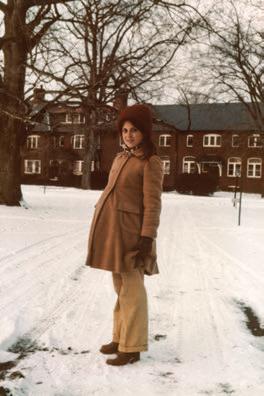
something about who you are that is not obvious to us. They all in their own way suggested I talk about identity. When advice from trusted sources is that consistent, I take it.
But why were they all saying the same thing? I didn’t ask any of them why (maybe I should have). Why do they think anyone wants to hear about what I was like when I was a student here? Why does one think anyone wants to hear about a job I had as a 19 year old? Why does anyone want to know about parts of my family history?
Here’s what I think the answer is: I suspect they suggested I tell something about myself that surprised them because the great question all teenagers wrestle with is, “Who will I be when I grow up?”and when teenagers look at adults, they often struggle to understand that the adult’s story is as complex as their own. To kids, adults appear to have become caricatures of their jobs or some other group. Maybe hearing about an adult’s identity will help you embrace your own multi-faceted story and worry less about which adult archetype you might become when you grow up.
So here are three short stories about me that my advisors suggested I share.
First, what was I like when I was a Groton student? This is perhaps best put in context by a now retired Groton faculty member’s comment to me three years ago when we bumped into one another next to the Schoolhouse. “Hello Adam,” he said. “I saw that you’re a trustee. I wouldn’t have expected that. I guess they like having people whose parents were trustees and I remember your father was one.” No filter. But I know where he was coming from. As a Second Former, I was about 5-3 and had bleached
white hair. By the time I graduated, I was 6-5 and my hair was dark, curly, and down to my shoulders picture me with Eliza Spence’s hair on my head. I was not much of a student nor much of an athlete nor artist. I graduated with three varsity letters al l three for being the head manager of the football team. I was in the highest Latin and Greek classes but never was encouraged to take the AP exam in either, probably because they would not have gone well. In fact, I don’t remember taking any AP exams. Before later transferring to Harvard, I started college at University of Chicago as the only Groton student that year (not one of thirteen!) and I got in off the waitlist after being instructed to write a letter to the head of admissions saying that I promised to work harder. That retired faculty member had an idea of what a trustee looked like and he didn’t think it looked much like me.
On to the second recommendation: Tell them about one of your jobs when you were 19. OK. After a short stint at University of Chicago, I decided to step back and take some time off. I worked as a bicycle messenger in Boston before email and digital signatures made the bicycle messenger business obsolete and I drove with a Groton friend to Alaska to butcher salmon on the twelve-hour night shift at a small processing plant next to the Kuskokwim River. After a bit more bike messengering back in Boston, I got on a plane in February to Kodiak, Alaska, with a tent, sleeping bag, cook stove, and $256 in my pocket, no credit card nor cell phone, with a loose plan to
Clockwise, from top left: Adam’s late mother, Rina, standing outside the chapel while she was pregnant with Adam; Rina and Adam in the same spot during his Second Form year; and the pair again on Prize Day in 1992.
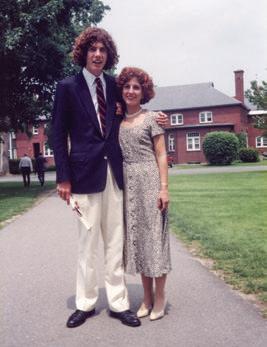
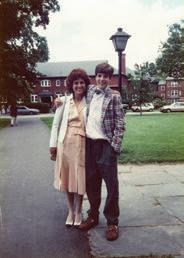
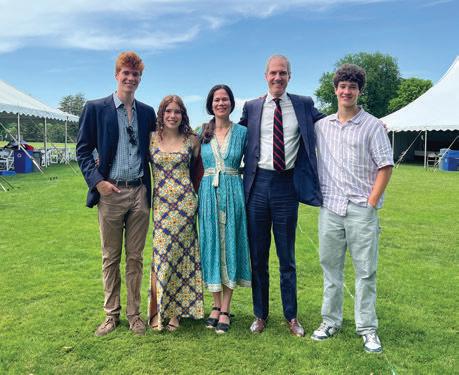
Our Groton friends don’t care what archetypes we take on in adulthood because our relationships were built before any of that mattered.
the University of Chicago and asked to return at the start of the next term in five weeks. I learned really fast that I didn’t want to do that job again.
The third suggestion was to talk about my family background. On my father’s side, my grandmother at 18 was invited by Eleanor Roosevelt to the White House for a dance. She had just finished at Milton and was on her way to college. On my mother’s side, my grandmother at 15 years old left her home in Jerusalem to get a job as a nurse tending to British soldiers who were fighting the Italians in Egypt in the Second World War. She was small, light brown skinned, descended from Bedouins, spoke Ladino, a form of Spanish spoken by Jews who had settled in the Middle East after being expelled from Spain 500 years prior, and she didn’t know anything about fancy parties at the White House in America.
Now you know three things about me that you didn’t know from looking at me. You know I was not a great student, that I took time off from college to work as a bicycle messenger and Alaskan crab fisherman, and that I’m descended not only from large northern Europeans, but also from Jewish Bedouins in the Middle East.
camp on the edge of town until I could get a job in a crab-processing plant. I scratch my head today about the wisdom of this approach, but anyhow. I walked out of the airport, stuck out my thumb, and got a ride. The guy who picked me up took me into town and before I knew it, I was aboard a very rusty eighty-sixfoot crab boat heading out into the Gulf of Alaska for the fifteen-day tanner crab season.
I had been reading a book about crab fishing that mostly focused on how many people were dying in what was at that time the most dangerous job in America. I had no intention of going to sea when I went to Kodiak, but the on-shore processing plants were not hiring and, when I was offered a job and a place to sleep that was not a tent, I decided that I’d found what I’d come for. The four other crew and I worked constantly in heavy seas, in the cold, dark Alaskan winter, with no return to shore until the short season ended. I didn’t get into a bed for the first thirty-six hours, slept next to the engine room for five hours, then went back to work for twenty-four. This was basically the pattern for a little over two weeks. It was terrifying in the beginning, and repetitive and boring by the end. When I got off the boat, I called
People tend to use simple identity markers as shortcuts in relationship building. We don’t spend the time to learn much about most people so we default to the external. I don’t think that we are going to change that. Shared experience greases the skids of relationships and relationships play a role in jobs, raising families, and building lives. When you get to college, you’ll see it happen fast pe ople organize themselves into categories. I’m a government person, I’m a Wall Street person, I’m an artist, a scholar, a Democrat, a Republican, and many others. We use these external identities to achieve basic objectives. That’s fine, but I think it makes looking into adulthood scary for young people who have not yet passed through the sorting hat stage of life.
The great thing about high school relationships is that they are formed before we shape our adult identities. They’re formed before we become who we will be when we grow up. I believe that’s why Groton relationships are so central throughout life for so many of us. Our Groton friends don’t care what archetypes we take on in adulthood because our relationships were built before any of that mattered.
None of us are what we appear to be at first glance. We are much more complex than the world’s simple labels can describe. So don’t worry too much about who you’ll be when you grow up because once you realize that everyone is so much more than they appear on the outside, you’ll understand that there’s really no one you can be but your own complex self.




David Landon ’56
Some Moments in a Gentle War
There are moments we need to celebrate and David Landon has done just that in his new book of poems: moments in a café on New York’s Upper West Side, on a hilltop overlooking the Ohio River, on a mountain top in East Africa, a mountain top in Tennessee, in an apartment overlooking the Hudson River. The poems tell the story of our “gentle war,” our commitment, at times a struggle, to care for each other and our world, from moment to moment, from day to day, from year to year.
Hugh Taylor ’83
Space Piracy: Preparing for a Criminal Crisis in Orbit
Space Piracy: Preparing for a Criminal Crisis in Orbit is a forward-thinking resource that considers, analyzes, and provides solutions to the influence of the ignoble side of humanity in the realm of outer space, where potential for crime, corruption, piracy, and war increases as the exploitation of space as a commercial
resource continues to develop. This book blends the authors’ knowledge with that of subject matter experts to deliver a holistic understanding of criminality in space and help readers broaden their horizons beyond their own area of specialization.
Elizabeth MeLampy ’12
Forget the Camel: The Madcap World of Animal Festivals and What They Say About Being Human
In Forget the Camel, animal advocate and lawyer Elizabeth MeLampy embarks on a cross-country journey to explore the uncomfortable truths behind American animal festivals. Hundreds of animal festivals take place around the world every year, each putting animals on display for humans to gawk at, demonize, or adore. But why? What value do these festivals and their rituals hold, and why, when the animals are in distress, do we insist that the show must go on? From the Iditarod to Groundhog Day, from rattlesnake hunts to frog jumping contests, humans across the country use animals to say something about ourselves, our communities,
and our history. Forget the Camel is a raucous entry into these festivals, uncovering how humans triangulate who we are and what makes us special through the symbolism we attach to animals and the stories we use to rise above them.
Lily Howard Scott ’05
The Words That Shape Us
Teachers know that what we say to students matters. Recent neuroscientific research confirms just how powerful words can be. They can literally shape our brains, inviting us to create new mental concepts and influencing our emotional experiences. This book shares classroom-tested strategies and brain-changing teacher language that positively transforms how students think, feel, and achieve within their classroom communities and beyond. Includes curricular connections that help students explore and internalize these transformative words.
► Please send information about your new releases to quarterly@groton.org.

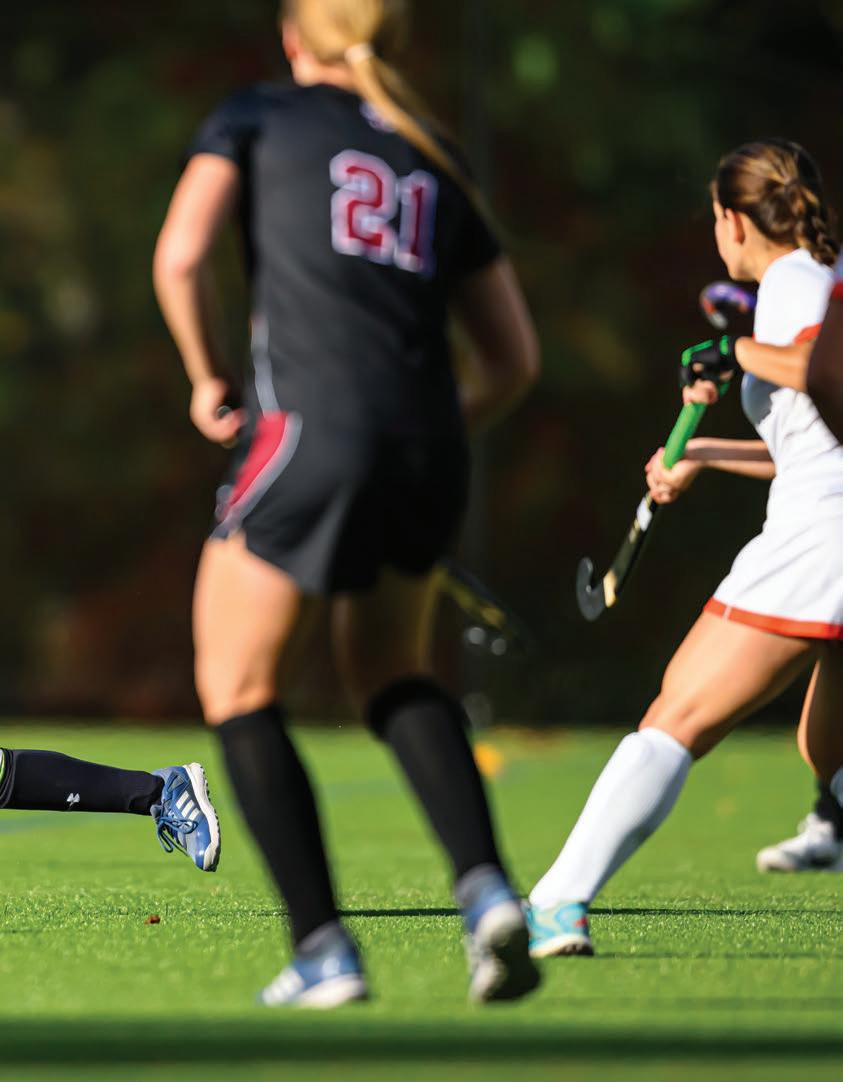

The 2024 girls varsity field hockey team finished with an overall record of 11–6, earning a spot in the Class B NEPSAC tournament thanks to outstanding player leadership and team cohesiveness. Throughout the season, the team was led by captains Dani Shyjan ’25, Mimi Burnett ’25, and Angie Che ’26, as well as Sixth Former Maddie Cronan. This leadership group set the tone for the team, fostering a winning mentality and a strong work ethic from the start of tryouts until our final game at Middlesex. Their ability to keep morale high, even in difficult moments, played a crucial role in the team’s success.
Some highlights from the season include a thrilling 3–1 victory over BB&N during a Friday-night under-the-lights game, where the team fed off the vibrant
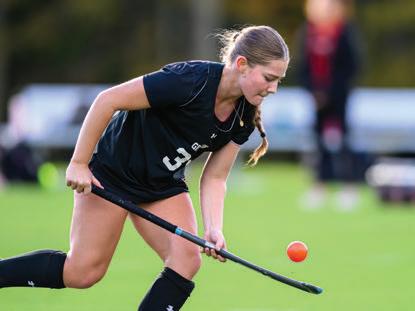
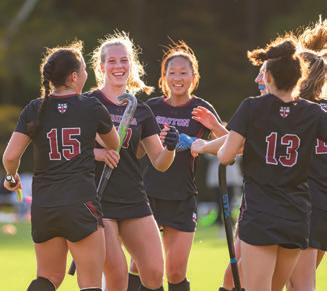
energy of the crowd and worked together to defeat a strong opponent. A few games later, the team traveled to Tabor on a Saturday and captured a hard fought 2–1 league victory, where Maddie tallied both goals and Sophia Scott ’27 kept the team in the game with several saves. When the St. Mark’s game came around, the team was on a five-game win-streak, looking to make it six straight. After a dominant start for the Zebras, St. Mark’s started gaining momentum and took a 2–1 lead going into the fourth quarter. Thanks to the leadership and resiliency of the group, the game became tied with 10:05 on the clock after Ella Nannene ’26 capitalized on a scramble in front of the net. The rest of that quarter saw back-and-forth action on both sides and the game needed overtime to decide a winner. The Zebras
earned a penalty corner in the overtime period and Dani Shyjan ’25 blasted a shot by the opposing goalie to seal the victory for Groton on rivalry and Senior Day! Overall, the Groton varsity field hockey team had a solid season full of joy, togetherness, and resiliency. They found ways to win and were able to overcome difficult moments in the season because of a strong leadership core in the forefront. Earning a back-to-back playoff berth is something they all should be very proud of. While the group graduates a strong Sixth Form core, the returners remain hungry and determined for more accomplishments next year.
—c oach jacqueline diffley

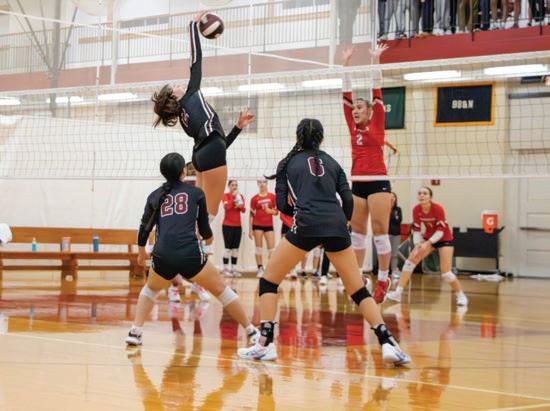
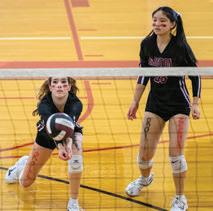
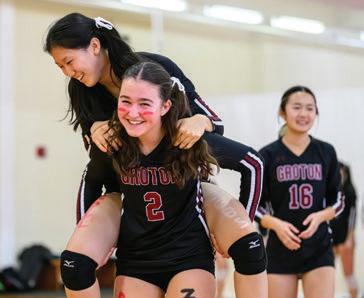
Formidable, hardworking, and plucky until the end, Groton volleyball built on the shoulders of previous seasons to finish with the best record in school history. In the regular season, the team went undefeated in our class and went 11–1 in the ISL, earning us second place league finish. In tournament play, we advanced to the semifinals match, losing climatically in the fifth set by the narrowest two-point margin in extra-play but finishing out the season with an impressive 13–3 overall record. Nearly half of our players earned league honors, a true testament to the depth of this group.
In their first season as a coaching duo, Celene Ibrahim and Marissa Bunnewith were consistently impressed with the dedication, determination, and conviviality of the team. Sixth Form
co-captains Caiyu Yang and Anjanette Lin fostered this atmosphere and also had standout seasons on the court. With five rising seniors, we can anticipate another competitive fall in 2025, led again by our steady co-captain Sophia Leng ’26 and our zesty new co-captain-elect Cheyenne Zheng ’26.
We owe a debt of gratitude to the athletic staff for keeping us healthy and well equipped as well as to Ms. Jo Clair for helping us with our all-important mental game, and, finally, to players-turnedmanagers Ava Meyer ’26 and Emilia Werkun ’26 for their daily presence and diligent record keeping. Our parents and fervent fans left no black-and-white stripe unworn! Roll Zebs!
—c oach celene ibrahim

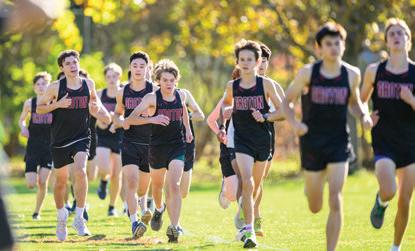
“Just another group of hard-running boys through the woods of New England with smiles on their faces and lasting shared stories.” This is how Coach Bert Hall sums up our season. And that’s the best synopsis, though there’s more to our story.
Twenty-five boys and five coaches (the most mentors we’ve had in years) started in September by summiting Mount Monadnock, a tradition we hope to continue as we set our sights high and put in our paces to get ready for races. Coach Hall pulled in the reins on climbing Wachusett so that we wouldn’t overextend ourselves, putting the mantra “less is more” into practice. With more coaches, we were able to send squadrons of harriers without hurrying through the woods, fire it up to go fast for intervals on our new track, and then let loose on race days. We

benefitted beautifully with the added expertise of Coaches Mary Carey, Desmond Goodwin, and Luke Tichi, a recent graduate of Williams College who had run under the wings of our own Jamie Norton ’ 10.
While our ISL win-loss record before the Championships was 11–5, we were able to race ahead of BB&N at Wrentham on November 1 to place fifth in our league. It’s always satisfying to show signs of improvement, and all of our runners got speedier. Notable accomplishments included Ashton Vertus ’28 (our JV Coaches’ Award winner) running seven minutes faster and Oliver Hochman ’28 (our JV Most Improved Runner) running eight minutes faster this season.
Hosting NEPSTA’s 2024 D2 Championship at and with Brooks School
was a highlight, and Groton placed fifth on their challenging new course in a field of twenty-two boys’ schools from New England. Most gratifying, though, was reading and seeing our captains’ experiences with the team this year. Liam Warren ’25 wrote, “BXC became more fun every year,” and Christopher Hovet ’25 was enwreathed in a pack of teammates at the New England Championship celebrating our comradery and community. We are fortunate to have such momentum and spirits that keep our striding and our stories soaring. —c oach john capen

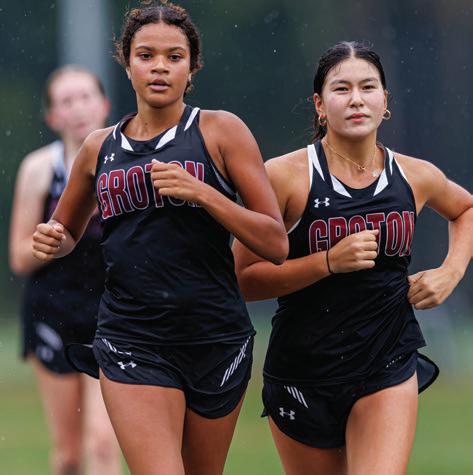
The girls cross country team came into the 2024 season excited to welcome some talented newcomers to a solid group of veteran runners. The team earned a record of 7–5 in the ISL during the regular season before finishing eighth at ISLs and sixth at New England’s.
Over the course of the season, eleven different girls finished in our varsity seven, including five runners who earned varsity letters for the first time Gabriela Coates ’28, Izzy Hall ’28, Ceres Moraitis ’28, Emma Xi ’29, and Kelly Zhao ’29. Ceres and Kelly quickly established themselves as top runners in our league and kept us close in even the toughest races of the season. Captains Lindy Zhang ’25 and Gabriela Gil ’25, Sixth Formers Caroline Creasy and Penelope Tregoe, and Fifth Formers Samara Gorton and Sydney
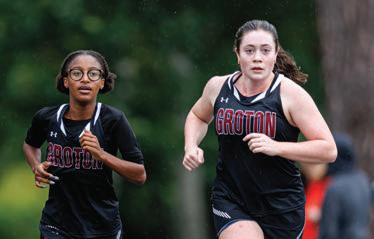
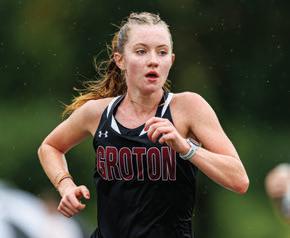
Nelson all made important contributions to our varsity group over the course of the season. Captain Margaret Kaneb ’25 was a hard-working and committed leader for our JV squad throughout the season, and we appreciate the contributions Tori Reece ’25 made to our group in her four seasons with the team.
While we graduate a large and impactful group of Sixth Formers, we see great potential in our younger runners and look forward to building on the hard work and improvement they showed this fall.
—c oach michael o’donnell
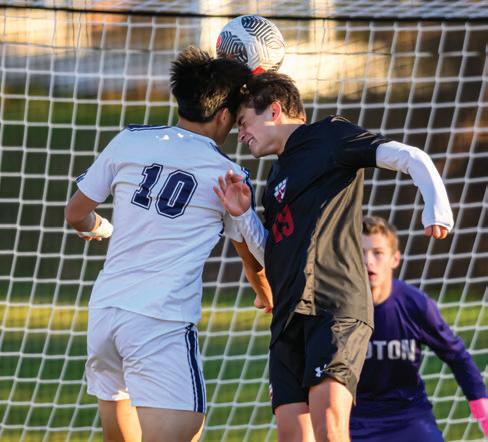
The soccer season started in early September with over thirty new and returning student-athletes coming to Groton for preseason. Led by captains Will Klick ’25 and Edward Wilkey ’25, the group came together well and established a strong rapport during training sessions and scrimmages. The team also went to Newton, MA, to watch Boston College take on Syracuse. Everyone was excited and energized to be together. Throughout the week of preseason, the team worked hard and supported each other during training.
The team held formal tryouts to get to their final varsity roster. This year, the team was led by five Sixth Formers: captains Will and Edward were joined by Angus Miller, Jason Mah, and Kiran Sen. The rest of the squad was made up of new
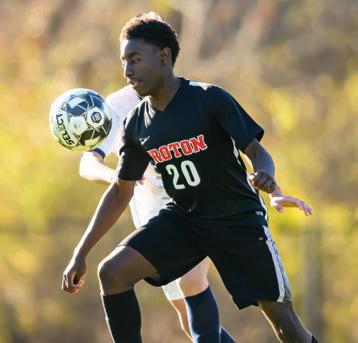
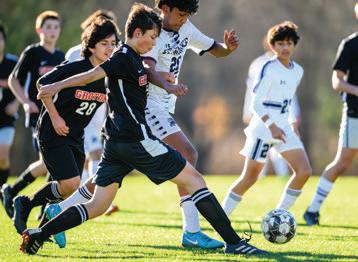
and returning players, including Arthur Murray ’ 26, Alex Foley ’ 26, Miles Zhang ’26, Jiayang Kang ’28, Eric Zhu ’27, Alex Holden ’27, Nick Holden ’27, William Cai ’26, Hayun Shin ’27, Ettore Monson ’27, William Garcia ’27, Juan Minda Chiriboga ’28, Sanya Ogundipe ’27, Feranmi Adelakin ’27, and Roberto Palacios ’27. New Groton students Roberto Pignataro ’27 and Rex Hudson ’26 rounded out the squad.
The team finished with a record of 2–12–3. There was a notable win against Lawrence Academy under the lights in front of great fan support. The team also beat Thayer Academy 2–1 by scoring a goal in the last few minutes of a hardfought match. Though the record was not what the team hoped for, there were many close games. The team is still quite
young, with a total of twelve Third and Fourth formers. We know that the returning players will work hard in the offseason to push the program forward.
—c oach joe martinez

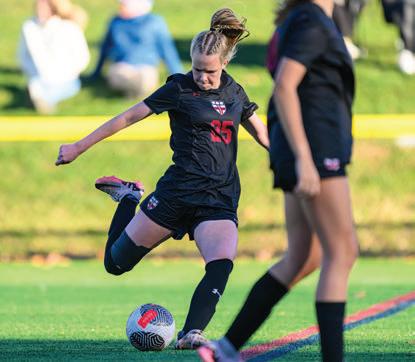
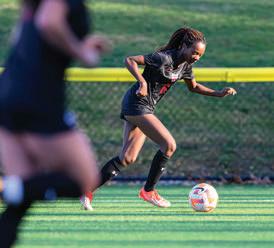

Led by a stellar group of Sixth Form captains and a talented core of young players, girls soccer entered the season ready for a big year. In the opening match, we competed strongly with a powerful Andover team, losing 3–2. Unfortunately, we also suffered four major injuries in that game, and it was the only time we had our entire roster available for the rest of the season.
Given the circumstances, it took us a few games to adapt. Our first win came against a very good Pomfret team that went on to win the NEPSAC Class C Championship. We also had tight games against a number of ISL playoff teams, including a tie against Brooks and a late, one-goal loss to Milton.
After a tough Parents Weekend defeat, we won three of our final five matches.
These wins included a complete team performance in a 3–0 victory over cross-town rival Lawrence Academy and a decisive 5–1 win on St. Mark’s Day.
The resilience that led to this late season success is testimony to the steady leadership of our four captains: Kate Bartlett ’25, Clara Maturo ’25, Genevieve Nelson ’25, and Alicia Ye ’25. Their efforts throughout the season will be missed, yet they have laid a solid foundation for next year’s team. They were also instrumental in helping this group earn the ISL Morahan Sportsmanship Award for the first time in fifteen years. There is no doubt that the future is bright for this team.
—c oach katie kreider

This year’s football team was characterized by a bond of brotherhood that belies its disappointing won-loss slate. Led by co-captains Salim Hill ’ 25 and JP Charpentier ’ 25, each of the forty-two members of the team showed commitment, eagerness to improve, spirited enthusiasm, and pride in the program and school day in and day out. While we enjoyed our largest numbers in years, youth, inexperience, and injuries hampered us in a league that has top-to-bottom depth.
This pre-season, we welcomed three excellent coach/mentors Ka rim Hill, Vince Bowman, and Alex Jordan to our staff. Each coach contributed invaluable skill sets from their varied backgrounds and experiences. Anchored by veteran coaches Jamie Lamoreaux and Harold Francis, they immediately, and seamlessly,
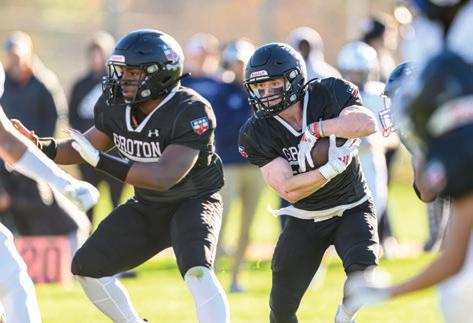
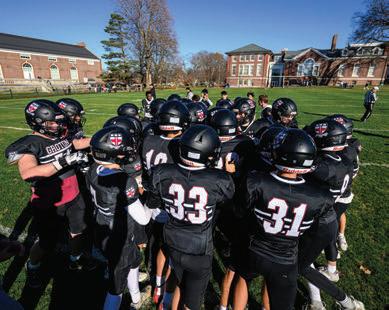
adjusted to Groton’s football and school culture, and the boys were fortunate to learn from them.
A highlight of our season was a visit from Marcus Jones, multi-threat player for the New England Patriots. His soft-spoken humble demeanor struck a chord with the team, as he chronicled his football narrative, his daily mindset for excellence, and life’s values and guiding principles. His celebrating his underdog status resonated with the zebras.
Other season highlights included our Parents’ Weekend game against Nobles, which saw our team make a valiant comeback in the second half led by multiple touchdowns from our co-captains, Salim and JP. Though the game ended in a loss, the team began to “click” and everyone saw the potential that this
program has. We had a similar effort in our night game at Brooks School. Groton actually had the ball for a longer period of time, but we just couldn’t quite get the job done. The boys left the field saddened by the loss, but encouraged by how they responded.
Finally, Coach Lam announced to the boys earlier this season that he would step aside after our St. Mark’s Game. “Lam” has injected a positivity, enthusiasm, and inspiring attitude in the program the past several years. His love for football is only exceeded by his love of kids, making each one smile on a daily basis, while also keeping them accountable. He coaches with and through his heart. And for this, we are all fortunate and grateful.
—c oach harold francis
field hockey
Most Valuable Player
Danielle Shyjan ’25
Coaches’ Award
Mimi Burnett ’25
Playmaker Award
Maddie Cronan ’25
Zebra Award
Angelina Che ’26
All-ISL
Angelina Che ’26
Danielle Shyjan ’25
ISL Honorable Mention
Maddie Cronan ’25
Ella Nannene ’26
Captains-Elect
Angelina Che ’26
Ella Nannene ’26
Jamie Noonan ’26
Charles Alexander Award
Salim Hill ’25
Coaches’ Award
JP Charpentier ’25
Nasir Hill ’26
Most Improved Player
Jack Eaton ’26
All-ISL
Nasir Hill ’26
Salim Hill ’25
ISL Honorable Mention
Freddy Dent ’26
Jack Eaton ’26
Charlie Stubbs ’26
All–New England
Salim Hill ’25
All–New England
Honorable Mention
Nasir Hill ’26
Captains-Elect
Freddy Dent ’26
Jack Eaton ’26
Nasir Hill ’26
Charlie Stubbs ’26
boys cross country
Most Valuable Runner
Christopher Hovet ’25
Coaches’ Award
Liam Warren ’25
Most Improved Runner
Thaddaeus Flatz-Ehfeld ’27
All-ISL
Christopher Hovet ’25
ISL Honorable Mention
Liam Warren ’25
Captains-Elect
Chase Bellamy ’26
Mateo Garciarramos
Pe tricioli ’26
girls cross country
Most Valuable Runner
Ceres Moraitis ’28
Coaches’ Award
Lindy Zhang ’25
All-ISL
Ceres Moraitis ’28
Kelly Zhao ’29
ISL Honorable Mention
Lindy Zhang ’25
All–New England
Ceres Moraitis ’28
All-NEPSAC
Ceres Moraitis ’28
Captains-Elect
Samara Gorton ’26
Stephanie Mo ’26
Sydney Nelson ’26
volleyball
Coaches Awards
Caiyu Yang ’25
Cheyanne Zheng ’26
Most Improved
Allyson Lu ’27
All-ISL
Alicia Leng ’28
Cheyanne Zheng ’26
All-NEPSAC
Tina Scalese ’26
All-NEPSAC
Honorable Mention
Rowan Trevino ’27
ISL Honorable Mention
Sophia Leng ’26
Captains-Elect
Sophia Leng ’26
Cheyenne Zheng ’26
boys soccer
Most Valuable Player
Will Klick ’25
Coaches’ Award
Edward Wilkey ’25
Most Improved Player
Roberto Palacios ’27
All-ISL
Edward Wilkey ’25
ISL Honorable Mention
Will Klick ’25
All–New England
Will Klick ’25
All–New England
Honorable Mention
Edward Wilkey ’25
Captains-Elect
JC Minda Chiriboga ’28
Arthur Murray ’26
Roberto Pignataro ’27
girls soccer
Most Valuable Player
Tyler Martens ’27
Sixth Form Award
Kate Bartlett ’25
Genevieve Nelson ’25
ISL Sportsmanship Award
Team
All-ISL
Tyler Martens ’27
ISL MVP
Tyler Martens ’27
ISL Honorable Mention
Laura Austen ’27
Oona Kathan ’26
All-NEPSAC
Honorable Mention
Tyler Martens ’27
All-State
Tyler Martens ’27
All-Region
Tyler Martens ’27
Captains-Elect
Grace Best ’26
Oona Kathan ’26
Jess Shapiro ’26
Follow Groton Athletics on X: @GrotonZebras
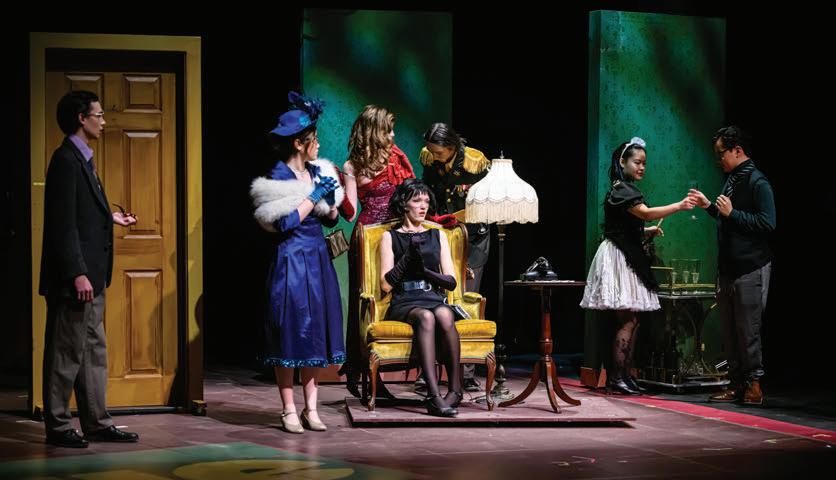
The fall 2024 theater production was Clue on Stage. Based on the iconic 1985 Paramount movie which was inspired by the classic Hasbro board game, Clue is a hilarious farcemeets-murder mystery. The tale begins at a remote mansion, where six mysterious guests assemble for an unusual dinner party where murder and blackmail are on the menu. When their host turns up dead, they all become suspects.
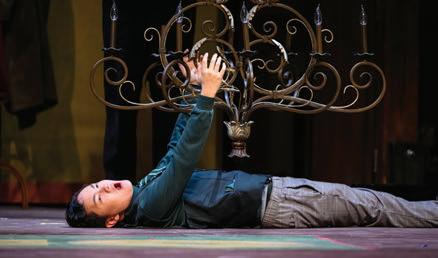
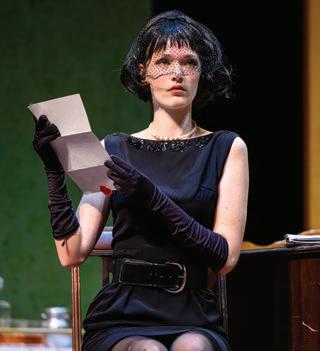
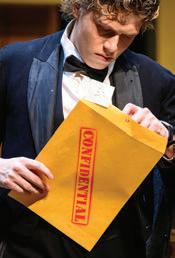
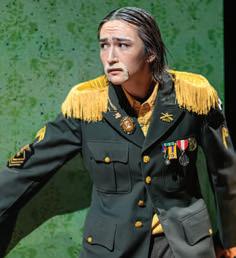

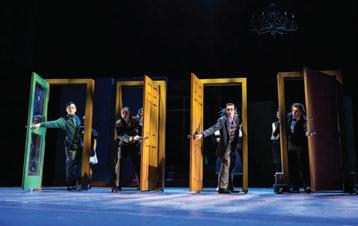
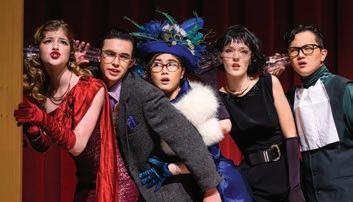
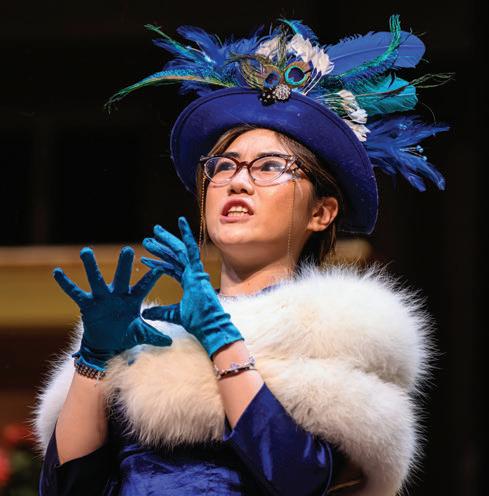
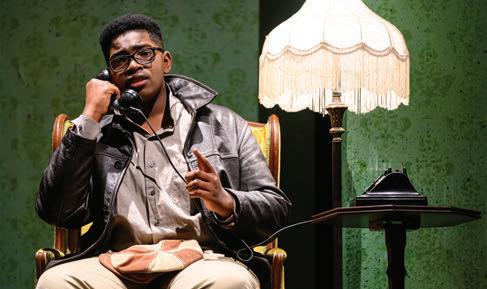
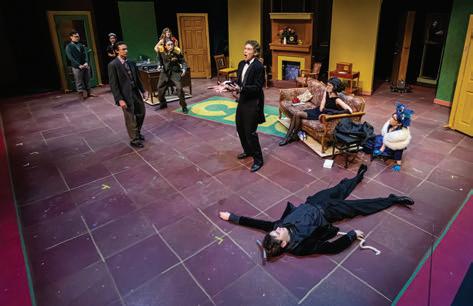
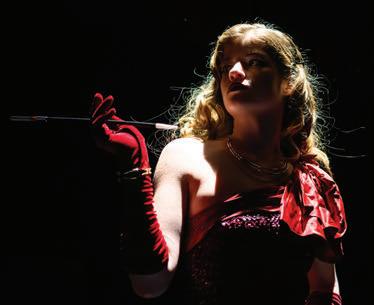
groton school’s de Menil Gallery celebrated the start of its 2024–25 season with an opening reception for “It’s Personal,” an exhibition of paintings by Sarah Diamond and Elizabeth Noble curated by Gordon Chase, on September 29, 2024.
This collection of thirty interpretive paintings captures with a wonderful honesty who a series of individuals are mother, child, friend, grandmother al l seen up close and presented with a generous use of paint, light, and color.
“It was exciting to put this show together,” said Mr. Chase at the reception. “Knowing these two artists and having the luxury, the pure joy, of choosing from among all of the wonderful things they’ve created, was an inspired project
for me as a curator.
“These subjects mean something to the painters who painted them,” he added, “and, by extension, I think they invite us to share in the idea of being seen and being heard, which is something that everyone seems to be looking for lately.”
Addressing the collected crowd, both painters thanked the people who supported them throughout their career, either by patronage or inspiration.
“I don’t think anyone gets to make art like this, or show art like this, without the support of a huge community,” said Ms. Noble. “So thank you.”
“I don’t show work very much and so this was both slightly nervous-making and gratifying,” said Ms. Diamond. “I’m
really appreciative of the opportunity. I paint because I have to, and make things because I must. I just like to look at everything around me and try to understand it if I can.”
In the selected paintings, each artist makes use of metaphoric devices to enhance each interpretation whether by means of bold expressive strokes and slashes of color, or with the addition of surrealistic shapes or symbols.
“I knew that both of them were painters who really loved to use paint, and really push the stuff around, and that was something that I think deserves more attention that it gets in a world where we tend to rely on photographs so often,” said Mr. Chase. “These are pure painters, artists of the original kind, and it’s a real treat to choose these pieces and, as a theme, to explore this idea of interpretive portraits that weren’t just descriptive but really captured the humanity of these subjects.”
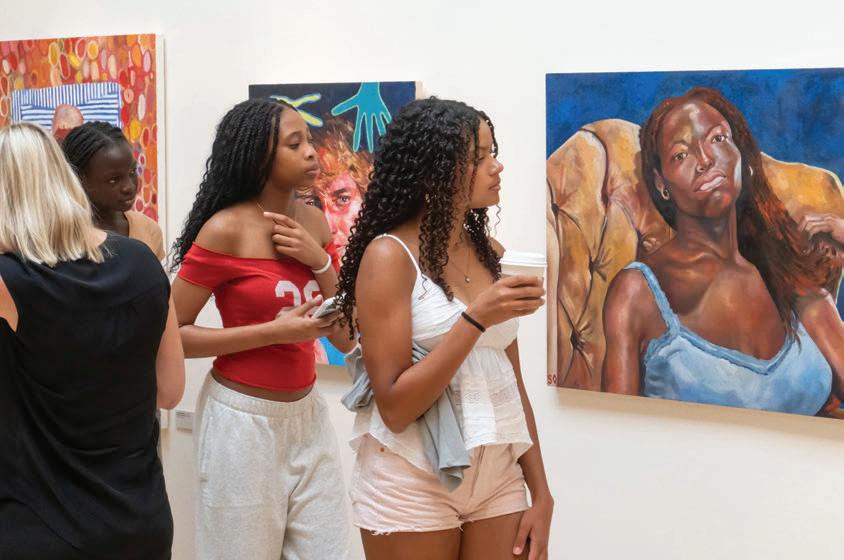
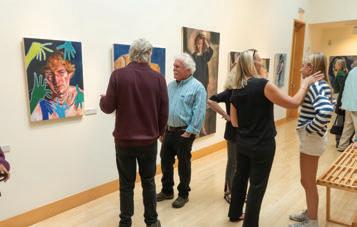

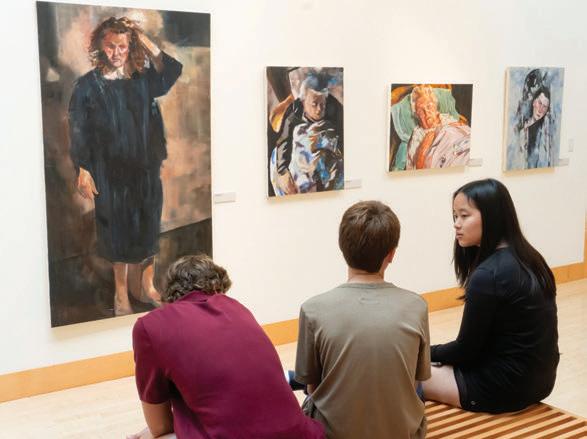
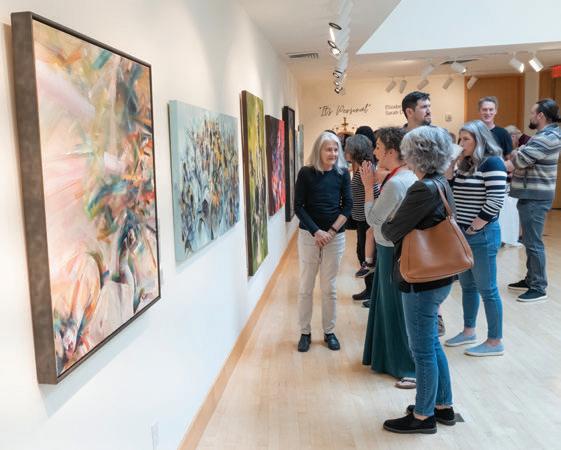
By Wilford Welch ’57
hugh scott , brought up in Wellesley and New York City, was one of thirteen First Formers who arrived at Groton in the fall of 1951. For the next six years he was recognized by everyone at the school as the best athlete in every sport he chose to play. That included football, where he was often referred to by the Boston Globe as “The Great Scott.” He was also a superb hockey, baseball, tennis, and fives player. He was a key member of Groton’s undefeated football and hockey teams. His father, Robert Scott 1927, who lived in Wellesley, could usually be seen on the sidelines of most any sport his son played in.
“Scotty” was a quiet force. He got good grades, but athletics and art were where he excelled. He was a deeply committed and caring friend to many of us. Conversations with him were driven more by his questions and interest in others than any talk about himself. He had a wry sense of humor and was a good singer in the “Six Pack,” a group of classmates who sang at a few Groton functions and made a record.
Scotty went on to Princeton where he played varsity hockey and football. He was voted All-Ivy in football for being best in conference at his position. But his interest in the arts, including sketching, water coloring, and photography, is suggested by his decision his senior year to forgo lacrosse so he could take a sculpture course.
graduated, and joined by two Peabodys and Charlie Devens 1928, Charlotte Joslin ’85, and Richard “Jake” Congelton Jr. as a coach, among others.
Scotty and his wife Donna and their two children, Hugh Scott Jr. and Alexandra, lived for many years in Tiburon, CA, across the bay from San Francisco. It was there that the “Great Hugh Scott” passed away on November 24, 2024, at the age of 85.
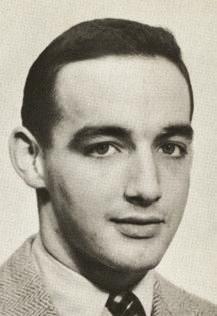
Following graduation, he served as a lieutenant in the U.S. Marine Corps. Soon after that, Scotty worked with Gordon Gund (also Groton ’57, and longtime chairman of the Groton Board of Trustees) in their property management company, GUS Enterprises, based in San Francisco. Together, over the next forty years, they successfully developed six garden apartment projects, six hotels, and an office building throughout the West Coast and Southwest.
In 2012, when Groton introduced its first Athletic Hall of Fame, covering 130 years of student-athletes, Scotty was a charter inductee, singled out as possibly the best football player who ever
i was a faculty brat, son of a teacher who during the Sunday Chapel service at Groton on December 7, 1941, got the news that Pearl Harbor had been attacked, got up in his vestments from behind the organ, bowed to the cross, and like other members of the faculty prepared to serve to the needs of teenage boys in a time of war on two continents. Our house was on the outer grounds of the school, behind Hundred House, next to the Dome and the Dome Yard where I played countless hours of varied stickball games. To a faculty brat, Groton School was like a small town unto itself, and similar to Bill Belichick growing up with his teacher/coach father at the Naval Academy, what Groton did in the three sports seasons mattered.
We loved walking the sidelines of the football field with Grottie in their Zebra uniforms that were still the fashion sixty years later. We played pickup hockey games on winter Saturday mornings when the school made the rink available to anyone living in the town of Groton. I cared most for spring afternoons, when I’d get off the Buckingham school bus and go to the baseball field for a practice or game and coaches Junie O’Brien and Jim Waugh would let me be the batboy or shag batting-practice fly balls. The spring of 1957 was the most memorable. Hugh Scott was the shortstop, and to this 12 year old he was the Cal Ripken of the Private School League. The second baseman was Bill Polk ’58, and they were both exceptional players.
Nearly seventy years later, Polk remembered that in home games I’d run out, pick up the bat, run back and always take my
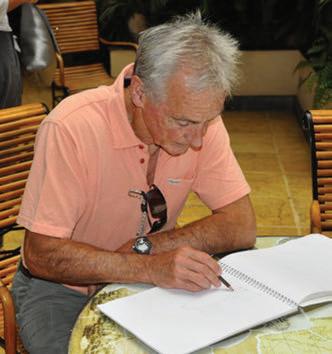
place, seated next to Jim Waugh. He treated me like a chosen student. I loved baseball, as he did. He talked of the changes Scott had made at shortstop with the tutelage of Mr. O’Brien, a Yale shortstop in Yale’s salad days with George H. W. Bush. Waugh raved about Polk at second, and, since Waugh was the second baseman/manager of a Groton town team that won four straight area titles, he was proud of his double-play combination because, in his words, “they’re very good athletes, they’re smart, and they like to play with one another.”
Waugh wanted to put on assorted defensive shifts, as he’d done managing the town team a ha lf-century before they were implemented by major league teams but practice time was limited, courses were difficult, and as Waugh pointed out, “one of the great things is that students have so many opportunities, be they in art, music, the choir, the glee club, drama, debating al most anything. Scott and Polk would participate in every one.”
To a kid in the 10- to 12-year-old period, Scott was Jackie Jensen, a Red Sox star player who was an American League Most Valuable Player, Rose Bowl running back star for the University of California, and Sports Illustrated cover boy. That 1957 Groton football team was one of the best of that era, and Scott was the star tailback in the single-wing offense, with Polk the fullback. The hockey team was undefeated. Scott went on to Princeton, where he played right wing, as he had on that Groton team with Stew Forbes ’57 at center, Gordon Gund ’57 and Ken McLean ’57 on defense and Polk the goaltender. In football, Scott would star as Princeton’s single-wing tailback, among the team leaders in rushing and passing three consecutive years and being honored with the John Prentiss Poe Memorial Cup, Princeton’s highest honor in recognition of ability, loyalty, and devotion to football. He played some baseball, and took up lacrosse before his senior year and was good at that.
“Scottie was very modest, quiet, a leader by example who was oblivious to being called ‘The Great Scott,’” said Polk upon Scott’s passing in 2024. “He loved music.” Scott was in Princeton’s “Tigertones” vocal group. “He loved art, and loved working on a sketch pad. He later became proficient as a sculptor. He was a great tennis player, at Groton or throughout his life.”
Polk further remembered in his Groton life that Scott was a form and school leader, and “No matter what he did, he led by example, with respect and modesty. He took advantage of everything Groton had to offer, even fives. One year a school from England was coming to Groton for a fives match. People wondered how he’d do against the Brits when they played the sport a lot more. For Scottie, it was no problem.”
After Princeton, Scott served in the Marine Corps in Okinawa, then later was an instructor for mountain warfare for climbing and skiing in the Sierra Nevadas.
I was never a Groton student in the Great Scott Era. But I remember sitting on the baseball bench next to Jim Waugh. Scott always gave thanks for retrieving his bat, quietly, earnestly. When Stew reached out to me and I talked to Bill Polk about Hugh, they reminded me of the phrase “To Serve is Perfect Freedom” we all looked at so often in the Schoolhouse study hall, and Paul Wright pertained how we treated others, and that I carry to our Foundation’s “Gammons Scholars” as the reminder that “Greatness Should be Measured in Goodness.” That, not touchdowns or goals or extra-base hits, is how Hugh Scott will be forever remembered in Groton School history, and what a 10-year-old faculty brat believed his father had devoted his life to fostering every morning that he slipped onto the bench at the organ in the Chapel.
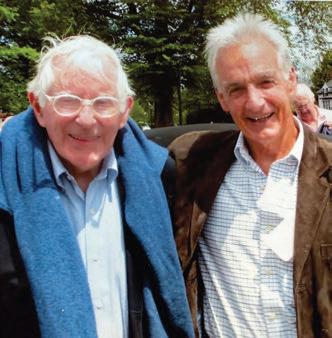
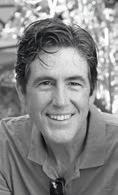
By Thomas McHenry ’73
we lost our Groton 1973 classmate Sam Mercer on February 12, 2024, to Younger Onset Alzheimer’s. We understand from his wife Tegan that the last several years were difficult for Sam, but that the film production community is filled with people for whom Sam made a difference and he is remembered for his generosity, pride and love for his family, and his prolific body of work.
The youngest of four brothers, all of whom graduated from Groton, Sam grew up in Weston, Massachusetts, but his love of film took him west to Occidental College and he never looked back. Groton can lay claim to a little of Sam’s passion for film as he got his start in film making at Groton in a course with Gordon Chase. Sam Hoar remembers: “We produced two films together both perfectly awful: a mob crime thriller starring Loz and Peabo, with Fred Morgan playing a bit role; and a version of Crime and Punishment starring Bill Sheeline, that Scott Blanchard called, in our form history, ‘a crime to produce and a punishment to watch.’”

After attending Occidental, Sam went on to a distinguished career as a film producer including most notably many films directed by M. Night Shyamalan such as The Sixth Sense, Unbreakable, and Signs, as well as other films like Van Helsing, Congo, and Things We Lost in the Fire and many others too numerous to list here. Cinematography was Sam’s initial pursuit, but his problem-solving skills, work ethic, and attention to detail led him into producing.
We are told that Sam made everyone on the set feel welcome and that is consistent with our distinct memory of Sam making his evening rounds, stopping to say hello and finding you with a book in hand asking: “Whatcha doing reading?” This was obviously good training for managing a film set.
Sam began as a freelance location and unit production manager. He then joined the Walt Disney Company as a production executive and then as vice president of motion picture production for Hollywood Pictures and ultimately at Industrial Light & Magic. Sam was a proud member of the Academy of Motion Picture Arts and Sciences, the Directors Guild of America, and the Producers Guild of America.
Sam married twice. His first marriage of fourteen years gave him his son Miles, a marketing executive with the Soho Grand and the Roxy Hotels in NYC. Sam’s marriage of twenty-plus years to Tegan Jones gave him his now 15-year-old daughter Sierra. Sam was diagnosed with Alzheimer’s in 2016 and that prevented him from joining us at our fiftieth reunion. However, his wife Tegan shared that: “Sam would have loved to attend, greeting each of you with his firm handshake, genuine smile, and glimmer in his eyes. He would have revelled in the stories being shared and would likely have contributed a few of his own.”
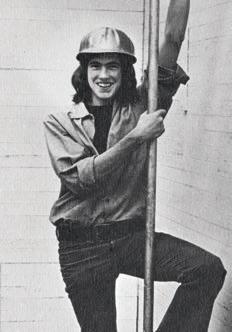
Form Notes are password-protected. Members of the Groton community may read them online by signing into GrotonConnect at www.grotonalumni.network.
Save the Date
Saturday, September 20, 2025 Groton School campus
During the 2025–26 academic year, Groton School will mark the fiftieth anniversary of coeducation on the Circle!

Join us on the Circle for a day of activities commemorating fifty years of coeducation: alumni, student, and faculty panels; athletic contests; and opportunities to connect and celebrate.
Mark your calendars now — additional details to follow.
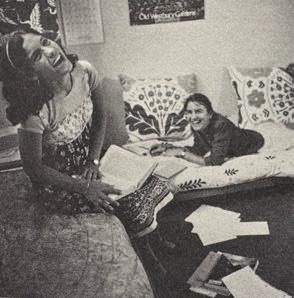

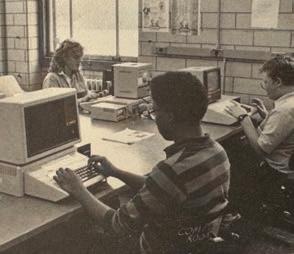
282 Farmers Row
Groton, Massachusetts 01450-0991
Change Service Requested
each year , the Groton School Library invites Sixth Form artists to submit a design for consideration in the search for a bookplate to be used in our new book purchases for the coming school year. This year’s winning Library Bookplate design is based on the stained glass window pictured here. The window is located in Chaplain Allison Read’s classroom and is dedicated to the memory of Phillips Brooks an i mportant 19th century theologian and educator, as well as a Groton School founding trustee.
The window is inscribed in Italian and Latin, from Dante, borrowing from the Gospel of Matthew and Virgil’s Aeneid:
Ministri e messaggier di vita eterna. Tutti dicean: “Benedictus qui venis!” e fior gittando e di sopra e dintorno, “Manibus, oh, date lilïa plenis”
Translated, it reads something like this:
. . . The servants and the messengers of God. They all cried, “Benedictus qui venis,” [“Blessed is he who comes,” Matthew 21:9] and scattered all around a floral spray, “Full hands give lilies” [Aeneid 883]
Besides his role as a trustee, Bishop Brooks was a major influence on Groton founder Endicott Peabody. In fact, Rev. Peabody wrote of Brooks’ passing and funeral in his diary, as transcribed below by Library

and Archives Associate Barbara Dailey. Mon. Jan. 23 Groton
. . . Heard of Bishop Brooks’ sudden death at 6:30 this morning. Greatly shocked. He has been one of the best friends I have ever had. I thank God for His goodness in giving me such an inspiration. May his hopefulness & buoyancy enter into my life & work hereafter. We must do more work now that he is gone. All of Boston profoundly stirred as over a personal loss.
Thurs. Jan. 26 Groton
. . . To Town with F., S.B., G.W.L., W.G.T. & wife; VIth Form to the Bishop’s funeral. Groton delegation kindly looked after. Large turn out of clergy. Bp. Lying in state 8–11. 13,000 passed by. Many stores closed. Vast throng in & outside of church . . . Service impressive very, very sad to see the vacant pulpit. God help us to fill up the gap with the spirit [which] our dear [bishop] has left behind him.
